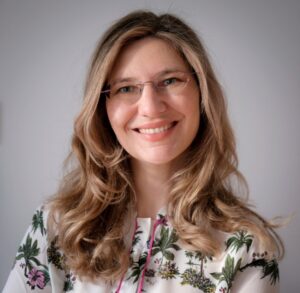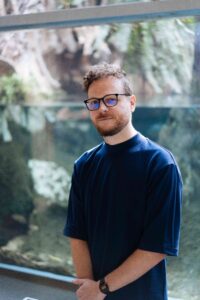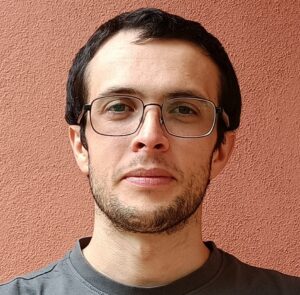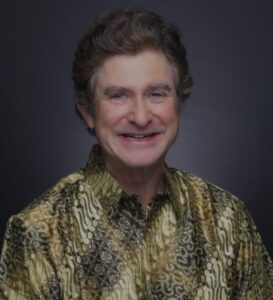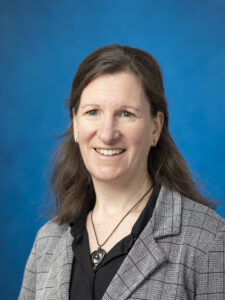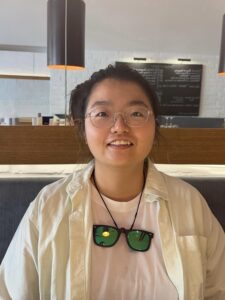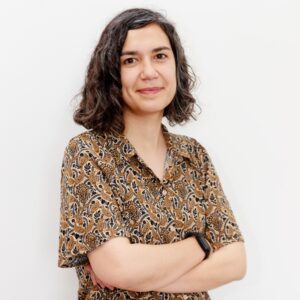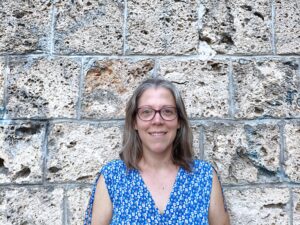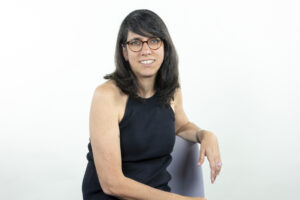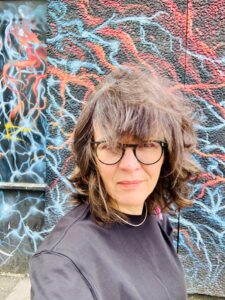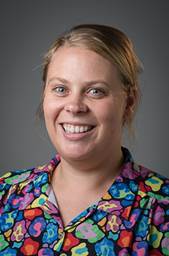|
|
Tanja Ahlin, PhDResearch affiliate, University of Amsterdam |
How do technologies shape elder care, especially when it is practiced at a distance? How do they influence what (health) care comes to mean and how it should be done to be considered good care? As an Anthropology and Science and Technology Studies researcher, I use ethnographic methods to explore how everyday digital and specialized health technologies participate in formal and informal elder care. In February 2020, I defended my PhD thesis on everyday digital technologies in elder care among Indian transnational families. I am currently a lecturer at UvA and Amsterdam Medical Center, teaching qualitative methods and social science theory. My doctoral research has been funded through the TransGlobalHealth Joint Degree program by the European Commission, and AISSR, University of Amsterdam. Previously, I obtained a MA in Health and Society in South Asia from Heidelberg University. Besides academic publications, my research has been presented in the Huffington Post, Madras Courier, and Vrij Nederland, and on websites such as Somatosphere and AllegraLab. Currently, I am working on a book project based on my PhD thesis, and I am also developing my new project on live and robot animals in elder care.
Recent publications
Ahlin, T., Mann, A. (2024). Ambiguous animals, ambivalent carers and arbitrary care collectives: Re-theorizing Resistance to Care Robots in a Dialysis Unit in Austria. Social Science and Medicine 365: 117587. https://doi.org/10.1016/j.socscimed.2024.117587.
Ahlin, T., Sen, K. and Pols, J. (2024). Telecare that Works: Lessons on Integrating Digital Technologies in Elder Care from Indian Transnational Families. Anthropology and Medicine 1-16. https://www.tandfonline.com/doi/full/10.1080/13648470.2024.2378726.
Ahlin, T. (2023). Calling Family: Digital Technologies and the Making of Transnational Care Collectives. New Brunswick: Rutgers University Press (open access).
|
|
Shilpa Bandyopadhyay, PhD |
Shilpa is an Assistant Professor (Psychology) and Associate Dean (Capacity Building) at the Jindal Institute of Behavioural Sciences, O.P. Jindal Global University, India. With a PhD in Psychology specializing in Geropsychology from IIT Delhi, she investigates the sociocultural and psychological dimensions of aging, including portrayals of later life in Indian media, and younger adults’ attitudes toward age-related bodily changes. In 2025, she was awarded the Innovative Research on Aging Award (Silver) by the Mather Institute for her work on Gerotranscendence in the Indian context. Shilpa is particularly interested in how digital media shapes age-related understandings and possibilities for dignity and resilience in later life.
Recent publications
Bandyopadhyay, S., & Singh, K. (2025). The experience of gerotranscendence in the Indian context. Journal of Religion, Spirituality & Aging, 37(3), 270–306. https://doi.org/10.1080/15528030.2024.2386263.
Bandyopadhyay, S., & Singh, K. (2025). Beyond Family Care: Exploring Perspectives on Old Age Homes in Contemporary India. Journal of Aging and Environment, 39(2), 166–192. https://doi.org/10.1080/26892618.2024.2302187
Bandyopadhyay, S., and Singh, K. (2023). Successful Aging in the Indian Socio-cultural Milieu. Journal of Cross-cultural Gerontology. 38, 191-200, https://doi.org/10.1007/s10823-023-09476-4
|
|
Roser Beneito-Montagut, PhDSenior Lecturer, Cardiff School Social Sciences, UK |
I see myself mainly as a sociologist, especially engaging with media, communication and technology studies. I am a senior lecturer in the Cardiff School Social Sciences (UK) and a member of the research group CareNet at the Internet Interdisciplinary Institute at the Open University of Catalonia (UOC). My current research focuses particularly on the topics of social connectedness and social media, digital later life, the digital ageing body and care in the networked society. I am interested in relations, emotions and affects. I have written about the socio-cultural and material dimensions of “being” and interacting online; emotions; methodological innovations in relation to the availability of digital data; and about digital later life and ageing.
Recent publications
López-Gómez, D., Beneito-Montagut, R. and García-Santesmases, A. 2020. No future for care without new digital media? Making time(s) for mediated informal care practices in later life. International Journal of Cultural Studies (10.1177/1367877920951818)
Beneito-Montagut, R., Cassián, N. and Begueria, A. 2018. What do we know about the relationship between Internet mediated interaction and social isolation and loneliness in later life?. Quality in Ageing and Older Adults 19(1), pp. 14-30. (10.1108/QAOA-03-2017-0008)
Beneito-Montagut, R., Begueria, A. and Cassian, N. 2017. Doing digital team ethnography: being there together and digital social data. Qualitative Research 17(6), pp. 664-682. (10.1177/1468794117724500)
|
|
Clara Berridge, PhD, MSWAssistant Professor, University of Washington, School of Social Work (Seattle) |
Clara Berridge is a social gerontologist who studies power and value tensions in the use of monitoring technologies and algorithmically mediated care. Over the past fifteen years, she has examined ethical and policy implications of a range of technologies across care contexts. Her intervention research (“Let’s Talk Tech”) engages people living with dementia in decision making about how various technologies should be used in their care. Clara’s first research job involved standing at intersections in Philadelphia counting drivers talking on their cell phones back when we weren’t sure if it was a problem. She still enjoys studying questions raised by new technologies, especially through international and interdisciplinary collaborations.
Recent publications
Berridge. C., Ho, A. (2025). Why AI Governance Should be a Focal Issue for Gerontology. The Gerontologist. https://doi.org/10.1093/geront/gnaf234
Berridge, C., Turner, N.T., Lober, W., Demiris, G., Kaye, J. (2025). Sharing patient technology preferences with care networks: stakeholders’ views of the “Let’s Talk Tech” decision aid for dementia care. Journal of Alzheimer’s Disease. https://journals.sagepub.com/doi/10.1177/13872877251332659
Berridge, C., Zhou, Y., Lazar, A., Porwal, A., Mattek, N., Gothard, S., Kaye, J. (2022). Control matters in elder care technology: Evidence and direction for designing it in. In Designing Interactive Systems Conference (DIS), Australia. ACM, New York, NY. https://doi.org/10.1145/3532106.3533471
Berridge, C., Grigorovich, A. (2022). Algorithmic harms and digital ageism in the use of surveillance technologies in nursing homes. Frontiers in Sociology. https://doi.org/10.3389/fsoc.2022.957246
|
|
Andreas Bischof, PhDChemnitz University of Technology |
With a background in media communication, sociology and cultural anthropology, Andreas Bischof engages in interdisciplinary collaborations researching society and technology. Currently, he serves as Assistant Professor in Sociology of Technology at Chemnitz University of Technology and principal investigator in research projects. In 2019, he co-founded the „Network for Integrated Research“, which is part of the German Federal High Tech Strategy. As an advocate for transdisciplinary and interdisciplinary research, he aims to sensitize research policy and public funders for the chances and challenges of integrating people in technology development.
Recent publications
Bischof, A., Lipp, B. (2023, in preparation). The co-constitution of ageing and technology in the making. The case of PARO the care robot. Frontiers in Sociology. Research Topic: Socio-Gerontechnology – New Perspectives on the Digital Transformation of Later Life.
Hornecker, E., Krummheuer, A., Bischof, A., Rehm, M. (2022). Beyond dyadic HRI: building robots for society. interactions 29,3 (May – June 2022), 48–53.
Maibaum, A., Hergesell, J., Lipp, B., Bischof, A. (2022): A Critique of Robotics in Health Care. AI & Society 37: 467–477.
Hornecker, E., Bischof, A., Graf, P., Franzkowiak, L., & Krüger, N. (2020). The Interactive Enactment of Care Technologies and its Implications for Human-Robot-Interaction in Care. In Proceedings of the 11th Nordic Conference on Human-Computer Interaction: Shaping Experiences, Shaping Society (pp. 1-11). https://dl.acm.org/doi/pdf/10.1145/3419249.3420103
|
|
Daniel Blanche-Tarragó, MResDoctoral student, Universitat Oberta de Catalunya |
Daniel Blanche-Tarragó is a doctoral candidate in the Information and Knowledge Society program at the Universitat Oberta de Catalunya (UOC). With a background in communication, sociology, and sociodemography, he has been involved in several research projects at the Communication Networks & Social Change (CNSC) research group. His work has focused on digital appropriation, digital inclusiveness, democratic practices and innovations, and information disorders. For his dissertation he examines the social and political activism of older adults in digital societies, taking into account biographical, sociohistorical, and technological factors.
Recent publications
Loos, E., Fernández-Ardèvol, M., Peine, A., Rosales, A., Beneito-Montagut, R., & Blanche-Tarragó, D. (2025). Making sense of older adults’ everyday smartphone use for social connectedness. Journal of Global Ageing, 2(1), 138–158. https://doi.org/10.1332/29767202Y2025D000000021
Blanche-T., D., & Fernández-Ardèvol, M. (2022). (Non-)Politicized ageism: Exploring the multiple identities of older activists. Societies, 12(2), 40. https://doi.org/10.3390/soc12020040
Rosales, A., & Blanche-T, D. (2022). Explicit and implicit intergenerational digital literacy dynamics: How families contribute to overcome the digital divide of grandmothers. Journal of Intergenerational Relationships, 20(3), 328–346. https://doi.org/10.1080/15350770.2021.1921651
|
|
Lorenzo Carta, PhD Student |
Lorenzo Carta is a PhD student in Applied Data Science and Artificial Intelligence at the University of Trieste. He holds a Master’s degree in Philosophy from the University of Pisa and a postgraduate degree in Science Communication from SISSA. His research focuses on AI technologies through the lens of Science and Technology Studies (STS) and the governance of emerging technologies. His current research investigates the design practices and expectations of AI-based gerontechnologies for predicting fall risk, studying how companies approach the design process and what obstacles they encounter. He also collaborates with SISSA Medialab and the Trieste Science+Fiction Festival on science communication initiatives.
|
|
Dr. Isil Coklar-Okutkan |
I am a social psychologist with interdisciplinary expertise spanning social, personality, and health psychology. I completed my PhD in Social Psychology in Türkiye in 2015. Subsequently, I worked at several universities in Türkiye and Ireland as a lecturer for 8 years, teaching courses such as Social Psychology, Research Methods, Ethics, and Personality. I supervised undergraduate and graduate students and conducted research on interpersonal relationships, including forgiveness, justice sensitivity, and attitudes toward violence against women.
Over the past three years, my research has expanded into digital and population health. At Trinity College Dublin, I have worked as a postdoctoral researcher on the Regional Health Authorities project, contributing to the development of a digital health policy paper in collaboration with the Health Service Executive (HSE). Most recently, for 2.5 years, I worked on the Horizon 2020 SEURO Project (Scaling EUROpean citizen-driven transferable and transformative digital health), which aims to prepare EU regions to implement people-centred digital integrated care solutions for multimorbidity management. Within SEURO, I led work packages on ethics, data protection, and dissemination, and contributed to trial implementation, data collection, and analysis.
Using a decade of academic experience and applied psychological practice, I aim to support interdisciplinary collaboration in health innovation and apply social psychological perspectives to promote effective digital health implementation for older adults.
Recent publications
Doyle, J., Harvey, S., Coklar-Okutkan, I., McAleer, P., Teixeira, F., & Dinsmore, J. (2025, in review). Influencing Digital Health Engagement of Older Adults with Multimorbidity during a Longitudinal Trial. CHI ’25: Proceedings of the 2025 CHI Conference on Human Factors in Computing Systems. CHI conference on Human Factors in Computing Systems, Yokohama, Japan.
Harvey, S., Coklar-Okutkan, I., Teixeira, F., Dinsmore, J., & Doyle, J. (2025, September 23). Using digital health technology to support weight management in older adults with multimorbidity: A longitudinal investigation [Oral presentation]. 16th European Society of Prevention Research Annual Conference, Berlin, Germany.
Boschi, T., Bonin, F., Ordonez-Hurtado, R., Pascale, A., Teixeira, F., Coklar-Okutkan, I., Morais, J., Polak, S., Jacobs, A., Doyle, J., & Dinsmore, J. (2024). ProInsight: A Tool for Risk Prediction and Impact Evaluation of Digital Health Solution Implementations. 2024 IEEE International Conference on Digital Health (ICDH), 40–49. https://doi.org/10.1109/ICDH62654.2024.00018
|
|
Michela Cozza, PhD |
Michela Cozza is an Associate Professor at the University of Trento-Department of Sociology and Social Research (June 2025-present) and was an Associate Professor at Mälardalen University (MDU), Department of Organization and Management, in Sweden from July 2016 to May 2025. She was a James Martin Visiting Academic at the Oxford Institute of Population Ageing, University of Oxford, UK (15 April-15 June 2024). She is an elected member and the Secretary of the Council of the European Association for the Study of Science and Technology (EASST; 2021 – present) and served as Chair of the EASST Ethics Committee (2024 – 2025). Her research interests include: body, care/caring, AI/digitalisation, ageing, epistemology, health and welfare technologies, and methodology.
Recent publications
Cozza, M., Wanka, A. (2025) “Editorial for the special issue the growing older of humans, nonhumans, and more-than-humans”, Journal of Aging Studies, 72, 101305
Cozza, M. (2023) “Performing the care crisis through the datafication of elderly welfare care”, Information, Communication & Society, 27(4), 806-814
Cozza, M., Ellison, K.L., Katz, S. (2022) “Hacking Age. Biohacking and Technologies of the Body”, Sociology Compass, 16(10), e13034
|
|
Marjolein E.M. den Ouden, PhDInstitutional affiliation |
Marjolein den Ouden is a professor Technology, Health & Care at Saxion University of Applied Sciences and at ROC van Twente (vocational education). She has a background in Human Movement Sciences (University of Groningen, MSc) and epidemiology (University of Utrecht, MSc). In 2013 she defended her PhD thesis on ‘disability in activities of daily living: a multifactorial approach’. In de past two years her research interest focusses on making the optimal match between humans and technology in the field of health and well-being. In interdisciplinary teams of professionals, researchers and technology developers we work on complex societal challenges, focusing on user-centered technology development and the adoption, acceptance and implementation of technology in health and well-being.
Recent publications
van Het Bolscher-Niehuis, M. J., den Ouden, M. E., de Vocht, H. M., & Francke, A. L. (2016). Effects of self-management support programmes on activities of daily living of older adults: A systematic review. International journal of nursing studies, 61, 230–247. https://doi.org/10.1016/j.ijnurstu.2016.06.014
de Vocht, H. M., Hoogeboom, A. M., van Niekerk, B., & den Ouden, M. E. (2015). The impact of individualized interaction on the quality of life of elderly dependent on care as a result of dementia: a study with a pre-post design. Dementia and geriatric cognitive disorders, 39(5-6), 272–280. https://doi.org/10.1159/000371874
|
|
Mathias Denecke, PhDInstitute for Media Studies, University of Ruhr |
I am working as a Postdoc in media studies and recently started to work on assistive technologies and ageing. Against the background of media-scholarly concepts of calculating environments as well as the debate on social reproductive labour, I focus on ambient assisted living projects in Germany. I analyse AI systems that generate patterns about the ‘behaviour’ of residents and investigate developers’ assumptions about well-being that are inscribed into the systems. I also want to trace how social reproductive labour for residents, relatives and caregivers is changing through assistive technologies. My further research interests include data labour, the ‘graying gig-economy’, and platform mediated care labour.
Recent publications
Denecke, M. (accepted). Umsorgendes Ambiente. Reproduktionsarbeit im technisch betreuten Wohnen. In C. Bartz, J. Cyrkel, F. Hüttemann, & M. Miggelbrink (Eds.), ComputerWohnen. Zur Geschichte des Computers in Wohnumgebungen zwischen Arbeit und Assistenz. transcript.
|
|
Fangyuan Chang Dr.KTH Royal Institute of Technology, Stockholm
|
Fangyuan’s research focuses on the mutual shaping of humans and technology at the intersection of science and technology studies (STS) and Human-computer interaction (HCI). Her main research interests lie in understanding the dynamics of technology adoption and domestication processes, as well as exploring the interactions between humans and machines in practice.
Fangyuan employs a mix of qualitative, ethnographic, and quantitative methods to investigate how technology is used in corporate organizations and its impact on human practices. By studying these interactions, she aims to uncover the ways in which humans shape technology and how technology, in turn, shapes human behavior. Additionally, she explores the practicalities of incorporating humans in the technology design process to create a future where AI revolves around human needs.
Recent publications
Chang, F., Östlund, B., & Kuoppamäki, S. (2023). Domesticating Social Alarm Systems in Nursing Homes: Qualitative Study of Differences in the Perspectives of Assistant Nurses. Journal of Medical Internet Research, 25, e44692.
Chang, F., Kuoppamäki, S., & Östlund, B. (2022). Technology scripts in care practice: A case study of assistant nurses’ use of a social alarm system in Swedish nursing homes. Digital Health, 8, 20552076221089077.
Chang, F., Eriksson, A., & Östlund, B. (2020). Discrepancies between expected and actual implementation: the process evaluation of PERS integration in nursing homes. International journal of environmental research and public health, 17(12), 4245.
|
|
Paul Joseph (“PJ”) FameliDoctor of Technology (DTech) Candidate at Purdue University Polytechnic Institute |
PJ Fameli is an Early Career Researcher in the Socio-Gerontechnology Network. He is a retired defense professional with over 40 years of extensive experience in international education, strategic training operations, and digital innovation. His distinguished career spanned strategic roles at Supreme Headquarters Allied Powers in Europe (SHAPE)/NATO, U.S. Army Training and Doctrine Command, U.S. Army Japan and overseas assignments in Europe and Asia. PJ led international military training programs, promoted host nation relations for U.S. Forces overseas, fostered cross-cultural collaboration and led multi-national military educational policy development. His academic expertise includes digital education, applied data analytics, and the integration of technological innovation within training frameworks. Currently a Doctor of Technology (DTech) Candidate at Purdue University Polytechnic Institute, his current research investigates the feasibility of smart toilet hygiene gerontechnologies for enhancing seniors’ quality of life. PJ holds an MSc in Digital Education from the University of Edinburgh, an MA in International Relations from Boston University, an MBA from Thunderbird School of Global Management, and a BSFS in International Affairs from Georgetown University. He seeks to contribute to advancements in socio-gerontechnology, focusing on digital inclusion, educational innovation, and cross-cultural adaptation of emerging technologies. His commitment to research-driven solutions underscores his dedication to improving societal outcomes for aging populations worldwide.
Recent publications
Doctoral Dissertation (In Progress):
Fameli, P.J. (2026). Innovation in Toilet Hygiene – A Meta-Review of the Use of Automated Bidets to Reduce Caregiver Burden for Seniors. Purdue University Polytechnic Institute. West LaFayette, IN, U.S.A.
|
|
Annette Franke, PhDProtestant University of Applied Sciences Ludwigsburg |
Prof. Dr. Annette Franke is Professor of Public Health, Social Gerontology and Methods and Concepts of Social Work at the Protestant University of Applied Sciences Ludwigsburg. Her research focuses on social construction and heterogeneity of old age, social cohesion, old age wellbeing, transitions in the life course and senior entrepreneurship. She is also interested in long-distance caregiving and how family carers can be supported by different technologies and social networks.
Recent publications
Stypińska, J.; Franke, A. & Myrczik, J. (2019): Senior Entrepreneurship – The Unrevealed Driver for Social Innovation. Frontiers in Sociology, 4 (2019), DOI=10.3389/fsoc.2019.00030
Franke, A. (2020): Pflege aus der Distanz: Emotionale Herausforderungen und psychosoziale Bedarfe bei „Distance Caregivers“, Psychotherapie im Alter, 17 (2), 177-196. DOI: 10.30820/1613-2637-2020-2-177
Franke, A.; Kramer, B.; Jann, P. M.; van Holten, K.; Zentgraf, A.; Otto, U. & Bischofberger, I. (2019): Aktuelle Befunde zu „distance caregiving“. Was wissen wir und was (noch) nicht? Zeitschrift für Gerontologie und Geriatrie, 52 (6), 521-528.
|
|
Simone Anna Felding, PhD candidateGerman Center for Neurodegenerative Diseases (DZNE-Witten) and Witten/Herdecke University |
Simone Anna Felding is a PhD candidate at the German Center for Neurodegenerative Diseases (DZNE-Witten) and Witten/Herdecke University specializing in health, technology and dementia. She is a social anthropologist carrying out research into the implementation of social robots for people with dementia in nursing homes as part of the Marie-Curie ITN programme DISTINCT. Besides working at DZNE Witten, she is also collaborating with the Karolinska Institute, Alzheimer Europe and the Department of Anthropology at the University of Copenhagen in her PhD
Recent publications
Koh, W.Q., Felding, S.A., Budak, K.B. et al. (2021). Barriers and facilitators to the implementation of social robots for older adults and people with dementia: a scoping review. BMC Geriatr 21, 351. https://doi.org/10.1186/s12877-021-02277-9
Felding, S. A. & N. Schwennesen (2021). Bag skærmen på en digital platform: Kunstfærdigt Integrationsarbejde og nye samarbejdskonstellationer. Tidsskriftet Antropologi 82:19-36.
Felding, S. A. & N. Schwennesen (2019). Når omsorgen udliciteres: En analyse af den konfliktfyldte omsorgstrojka mellem mennesker med demens, pårørende og plejepersonale på et plejehjem i Danmark. Tidsskrift for Forskning i Sygdom og Samfund 16(30):123-149. https://doi.org/10.7146/tfss.v15i30.114771
|
|
James Rupert Fletcher, PhDDepartment of Sociology, University of Manchester (UK) |
I am a Wellcome Fellow in the Department of Sociology at the University of Manchester, UK. His research covers several areas of the dementia economy, with an emphasis on using social theory and methods to understand dementia as a political entity. I have published on anti-ageing technoscience markets, psychiatric biomarker discovery economy and urban cognitive ageing. My lecturing spans medical sociology, the sociology of ageing, research methods and ethical governance. In my current research, I am using creative methods to document the experiences of passengers living with dementia as they navigate public transport.
Recent publications
Fletcher, J.R. (2024) The Biopolitics of Dementia: A Neurocritical Perspective. Routledge.
Fletcher, J.R. & Capstick, A. (eds) (2024) A Critical History of Dementia Studies. Routledge.
Fletcher, J.R. (2023) Cognitivism ageing: The Alzheimer conundrum as switched ontology & the potential for a new materialist dementia. Journal of Aging Studies.
 |
Vera Gallistl, MAUniversity of Vienna
|
Vera Gallistl is a sociologist who works in the field of critical and cultural gerontology. In her work, she focuses on the theoretical and empirical exploration of ageing with digital technologies. She is an affiliated student in the ACT (Ageing+Communication+Technologies) project, where she is involved in the cross-national longitudinal study “Older Audiences in the Digital Media Environment” and a member of the DFG-funded early-career researcher network “Material Gerontology”. Theoretically, Vera Gallistl is concerned with introducing practice and cultural theories in ageing research. She currently works on her PhD project in which she explores the cultural field as a topic for (critical) gerontology (Working title: “Orchestrating Ageing – Doing Age in the Field of Cultural Production”) as well as several national and international research projects at the Department of Sociology at the University of Vienna.
Recent publications
Gallistl, V. & Wanka, A. (2019): Representing the “older end user”? Challenging the role of social scientists in the field of “active and assisted living.” International Journal of Care and Caring, 3 (1): 123 – 128. https://doi.org./10.1332/239788218X15411705865226.
Gallistl, V., Rohner, R., Seifert, A. & Wanka, A. (2020): Configuring the Older Non-User: Between Research, Policy and Practice of Digital Exclusion. Social Inclusion, 8, 2. doi: 10.17645/si.v8i2.2607.
Wanka, A. & Gallistl, V. (2018): Doing Age in a Digitized World—A Material Praxeology of Aging with Technology. Frontiers in Sociology 3: 6. Link: https://doi.org/10.3389/fsoc.2018.00006.
|
|
Daniëlle van Gaans-RitecoScience practitioner at Collaborative Center (ACC) Older Adults of Tranzo- Tilburg University Nurse practitioner at Groenhuysen, residential care facilities Roosendaal |
Surveillance technology in dementia care raises ethical dilemmas rooted in stakeholder interests and values. The nursing home environment involves many stakeholders and as many perspectives. Every stakeholder has its own perspective, interests and values. People’s values shape their attitudes and behaviour, also towards surveillance technologies. The influence of stakeholder involvement and understanding of their values should not be underestimated. That is what I am realizing more and more in my work as nurse practitioner in nursing homes.
In 2020 I wrote a practical analysis, which led to the start of my PhD research in 2021 on stakeholder involvement in the use of surveillance technology for people with dementia in nursing homes. I focus specifically on the many perspectives, values, and the importance of knowing and acknowledging them. Starting with a scoping review on this topic, subsequently I conducted interviews with 38 participants from 13 different stakeholder groups. Their perspectives and values were explored. Starting in September 2025, we will engage with diverse stakeholder groups to develop a conversation instrument that will contribute to the involvement and connection with stakeholders. Of course, residents’ perspective will be reflected in this.
Recent publications
Van Gaans-Riteco, D., Stoop, A., Wouters, E. (2025) Surveillance technology for people with dementia in nursing homes: a scoping review on the values of involved stakeholders, JMIR Aging 8(1), DOI: 10.2196/64074
 |
Carla Greubel, MAUtrecht University |
Carla Greubel is a Ph.D. candidate at the intersection of Science and Technology Studies (STS) and Age Studies, working at the Copernicus Institute of Sustainable Development, Utrecht University. In her dissertation, she studies enactments of ‘good ageing’ in and across three different but interrelated contexts: (1) the European ageing and innovation policy discourse, (2) two digital innovation projects in the context of health and ageing (GATEKEEPER, a H2020 large-scale implementation pilot on smart living environments, and VinclesBCN, an initiative of the city of Barcelona promoting social connectedness), and (3) the everyday lives of older citizens participating in these projects in Italy, the UK and Spain. Drawing on empirical ethics of care, in particular, she investigates how among different ideas about and practices of living a ‘good’ ageing life, some come to (temporarily) matter more while others are marginalised. Her methods include policy discourse analysis, qualitative interviews, and ethnographic fieldwork. Together with her team at Utrecht University, Carla is responsible for coordinating the co-creation line of activities in the GATEKEEPER project, including the design and preparation of two cycles of stakeholder engagement workshops organized in nine pilot regions across seven European countries. Carla is the secretary of the Socio-gerontechnology Network.
Recent publications
Greubel, C.; Moors, E.H.M.; Peine, A. (2021) From Mattering to Mattering More: ‘Goods’ and ‘Bads’ in Ageing and Innovation Policy Discourses. Int. J. Environ. Res. Public Health 18, 7596. https://doi.org/10.3390/ijerph18147596
Greubel, C. (2020). Caring through Sound and Silence: Technology and the Sound of Everyday Life in Homes for the Elderly. Anthropology & Aging 41:1. Link: https://doi.org/10.5195/aa.2020.229
 |
Alisa Grigorovich, PhDPostdoctoral fellow |
Alisa Grigorovich is an Assistant Professor in the Department of Recreation and Leisure Studies at Brock University (St Catharines, Ontario, Canada). She has a PhD in Gender, Feminist & Women’s Studies from York University and training in social theory, qualitative and quantitative methodologies, policy analysis, and arts-based methods. Her research program focuses on the socio-cultural dimensions of aging, with particular attention to wellbeing, social inclusion, and the use of technology across home and institutional care settings (e.g. smart speakers, real time location systems, cameras, personal alarms). Her research is theoretically informed and primarily conducted in collaboration with older adults, formal and informal caregivers, and other community-based stakeholders. She is currently engaged in research projects across two interconnected areas: 1) Technology for aging well and caregiving; 2) Arts and leisure in dementia care.
Recent publications
Berridge, C., Grigorovich, A. (2022). Algorithmic harms and digital ageism in the use of surveillance technologies in nursing homes. Frontiers in Sociology (Sociological Theory), 138. https://doi.org/10.3389/fsoc.2022.957246
Grigorovich, A., Kulandaivelu, Y., Newman, K., Iaboni, A., Khan, S., Iaboni, A., McMurray, J. (2021). Factors affecting the implementation, use, and adoption of Real-Time Location System Technology for persons living with cognitive disabilities in long-term care homes: Systematic review. Journal of Medical Internet Research, 23(1). https://www.jmir.org/2021/1/e22831
Grigorovich, A., Kontos, P. (2020). Towards responsible implementation of monitoring technologies in institutional care. The Gerontologist, 60(7), 1194–1201. https://doi.org/10.1093/geront/gnz190
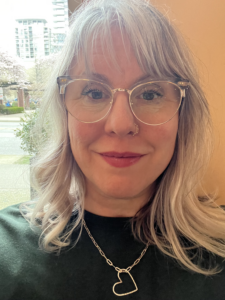 |
Julia Henderson, PhDReg(OT)BC, Assistant Professor, Department of Occupational Science and Occupational Therapy, University of British Columbia |
Julia Henderson is an Assistant Professor in the Dept. of Occupational Science and Occupational Therapy at University of British Columbia and holds a PhD in Theatre. Her research with older adults uses arts-based methods, especially theatre, to redress cultural ageism and promote citizenship. Julia is an investigator with the SSHRC Partnership Aging in Data Project and a collaborator with the SSHRC Partnership Engage ABLE Village Project. Recently, Julia partnered with Western Gold Theatre to create social media posts under the hashtag #HaveASeniorMoment, reimagining the term. Julia has published on digital engagement with people living with dementia in Frontiers in Health Services. Her other work appears in Leisure, Canadian Theatre Review, Journal of American Drama and Theatre, Theatre Research in Canada, Age Culture Humanities, Thornton Wilder Journal and Research in Drama Education. She also has recent chapters in Aging Studies and Ecocriticism, The Palgrave Handbook of Literature and Aging, and Pandemic Play: Community in Performance, Gaming, and the Arts.
Latest publications
Gillespie, B. Henderson, J. & Lee, H. (2024) Chapter 11: Performing Dramaturgies of Care in Quarantine: Aging, Inclusivity, and Aesthetics in a Virtual World. In C. Quirk and C. Ownbey (Eds.) Pandemic Play: Community in Performance, Gaming, and the Arts. New York: Palgrave Macmillan. (pp. 165-183).
Henderson, J. & Reid, C. (2023). Virtual collaborative creative engagement in a pandemic world: Creative connection for older adults with lived experience of dementia. Frontiers in Health Services, 3, https://doi.org/10.3389/frhs.2023.1223337. PA
Henderson, J., Reid, C., Devereux, B., Hershler, C., & Watt, S. (2022). Performing the Lived Experience of Dementia: Revealing Humanity through Evidence-Based Collaborative Creation. Canadian Theatre Review, 190, 53-59. https://doi.org/10.3138/ctr.190.012. PA.
Reid, C., Landy, A., & Henderson, J. (2022). ‘Knocking at the door of humanity’: Using co-creation and community-based participatory research to foster citizenship for individuals with lived experience of dementia, Leisure/Loisir, 47(2), 257-280. https://doi.org/10.1080/14927713.2022.2104347.
|
|
Helena Hirvonen, PhD, Senior lecturer |
Helena Hirvonen works as a senior lecturer of Social and Public Policy at the University of Eastern Finland, where she is the coordinator of the Research Consortium ‘Al-driven platform care: Promoting equal and inclusive job quality in long-term care’ (JPI/MYBL 2025-28). She received her doctorate in 2014 from the University of Jyväskylä, Finland, where she has since been affiliated with the Centre of Excellence in Research on Ageing and Care (2018-25), researching new technologies, ageing and care. Her research interests include welfare services and policies, digitalisation of care and work, gendered workplace relations and feminist theory.
Recent publications
Jokinen, E., Hirvonen, H., Mankki, L., Aho, T., & Lehto, I. (2024). Gender and Welfare Service Work in Biocapitalism: Lean in Action. Taylor & Francis. https://doi.org/10.4324/9781003309789
Mankki, L., Aho, T., & Hirvonen, H. (2023). Common sense put to work: The capitalisation of affects in the introduction of a Lean management model to healthcare professionals. European Journal of Cultural and Political Sociology (Print), 10(2), 309–330. https://doi.org/10.1080/23254823.2022.2156905
Hirvonen, H., Tammelin, M., Hänninen, R., & Wouters, E. J. M. (2021). Digital Transformations in Care for Older People: Critical Perspectives. Taylor & Francis. https://doi.org/10.4324/9781003155317
|
|
Yiqing HuangPhD candidate, University of Bristol |
Yiqing Huang is a PhD candidate at the School of Education, University of Bristol, supervised by Professor Helen Manchester. She holds an MSc in Education from the University of Southampton (2022).
Her research explores how digital technologies shape and are shaped by the everyday lives of older people. She is particularly interested in how digital technology becomes part of the ageing experience. Yiqing uses qualitative methods, including mapping and narrative interviews, to understand older adults’ perspectives and practices in digital environments.
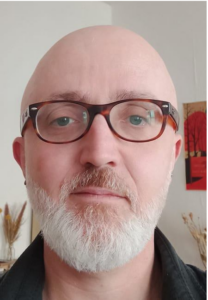 |
Christophe Humbert, PhDSociology research fellow. PSInstitut / University of Strasbourg |
My work focuses on innovation in the healthcare field, and more specifically in gerontology (homecare, nusing homes).
Focusing mainly on the sociology of ageing, health and innovation, my approach consists in questioning what a digital, organizational and/or social innovation process “moves” in its wake on the scale of a territory (a département in the context of my thesis), or of an organization (e.g. a given nursing home), and what it brings to light. In this way, I interrogate several polysemous concepts, questioning the way in which innovation acts as an analyzer of what already exists and a catalyst for transformation: autonomy, social ties, quality of care, etc.
For example, while the field of gerontological action has been portrayed in the scientific literature as negating the decision-making autonomy of the elderly, I have proposed a typology of “forms of autonomy”, brought into play by the deployment of an information system for local gerontological coordination in a French département. As part of the INNOVEHPAD project, which examines digital uses for the social bond between nursing home residents during a pandemic (COVID-19), I question the way in which the social ties are transformed, becoming the object of complex mediations, networking humans and digital objects.
Latest publications
Humbert, C. (2023). Changes to care professions in the context of innovation in older adults care coordination, Gérontologie et société, 45(172), 2023 (English version forthcoming on Cairn International).
Racin, C., Minjard, R., Humbert, C., Braccini, V., Capelli, F., Sueur, C., Lemaire, C. (2023). Analyzing the use of videoconference by and for older adults in nursing homes: an interdisciplinary approach to learn from the pandemic”, Frontiers in Psychology, 14, 2023. <https://doi.org/10.3389/fpsyg.2023.1154657>
Lemaire, C.*, Humbert, C.*, Racin, C., Sueur, C. (2023). Use of Digital Technologies for Older Adult’s Ties during Visitation Restrictions in Long-Term Care Facilities : A Scoping Review, JMIR Aging, 6 (*These authors contributed equally) http://dx.doi.org/10.2196/38593
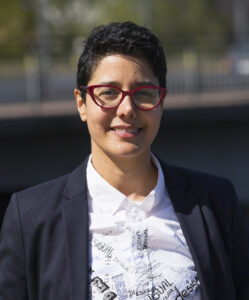 |
Tara Mehrabi, PhDSenior lecturer in Gender Studies, Karlstad University, Sweden |
I am a feminist STS researcher and a founding member of the Queer Death Studies Network https://queerdeathstudies.net/. In my research, I explore material-discursive entanglements and situated practices through which life/death, bodies, gender, ageing, subjectivities, and care come to matter in various locations. Often combining intersectionality with feminist posthumanities/new materialism and digital humanities. Since 2023, I have been working on a new project, Ageing Well with Digital Technologies, which explores the situated materialisation of inclusiveness and independence within the context of welfare technologies implementation for older adults in Sweden. This project is part of the Digital Health Innovation program (DHINO), funded by the European Regional Development Fund and the Region of Värmland, which ends in 2026 https://www.kau.se/ctf/dhino. Since June 2025, I have been part of another research program, Operationalising Human Rights in the Design of AI-supported Digital Health, funded by KK-Stiftelsen.
Latest publications
Lykke, L., Mehrabi, T., Radomska, M., eds. (fothcoming 2025). The International Handbook of Queer Death Studies. Routledge.
Kontturi, K., Leppänen, T., Mehrabi, T., Tiainen M., eds., (2025). New Materialisms and Intersectionality: Making Middles Matter. Routledge Intersectionality Series. ISBN 9781032518015.
Mehrabi, T. & Straube, W. (2024). “Unsettling Intimacies: On world-making practices with the Other in Minoosh Zomorodinia’s mixed-media installation Knots and Ripples”. NORA – Nordic Journal of Feminist and Gender Research, 1–15.
 |
Agnete Meldgaard Hansen, PhD.Roskilde University |
My research focuses on care work and how new ideals and approaches to care transform especially eldercare practices. I have a background in sociology of work and primarily work with qualitative methods, especially interviews, ethnographic field studies and document analyses. My theoretical inspiration is drawn from critical sociological approaches to work, feminist care theories, and socio-material understandings of bodies and technologies in working life.
Since beginning my PhD in 2011, my research has focused on how active ageing and ‘reablement’-ideals change the bodywork of care, and care professionals’ identities and understandings of ‘good care’. In close relation to these changes, I have also explored how the use of new technologies in eldercare contributes to this development, studying how technologies such as wash-and-dry toilets, sensor-flooring, tele-care and virtual homecare change care practices. My current research focuses on how dignity and dignified care is articulated and pursued in eldercare policies and practices, and how new care technologies are related to these pursuits
Latest publications
Hansen, A. M. (2022). Dignity equals distance? Pursuing dignity in care for older adults. Ageing and Society, FirstView. https://doi.org/10.1017/S0144686X21000891
Hansen, A. M., & Grosen, S. L. (2022). New Choreographies of Care: Understanding the Digital Transformation of Body Work in Care for Older People. In H. Hirvonen, M. Tammelin, R. Hänninen, & E. J. M. Wouters (Eds.), Digital Transformations in Care for Older People: Critical Perspectives (pp. 166-185). Routledge. Routledge Studies In The Sociology Of Health And Illness https://doi.org/10.4324/9781003155317-10
Grosen, S. L., & Hansen, A. M. (2021). Sensor-floors: Changing Work and Values in Care for Frail Older Persons. Science, Technology & Human Values, 46(2), 254-274.
https://doi.org/10.1177/0162243920911959
 |
Lily Haopu Ren, MHLP, BSc.University of British Columbia (UBC) |
I graduated from Master of Health Leadership and Policy (MHLP) in Seniors Care at the University of British Columbia (UBC) and Bachelor of Science in Accounting and Finance (Honours) at the London School of Economics and Political Science. After graduation from MHLP, I received academic training in the fields of sociology, public health and business at UBC. Currently, I am the Knowledge Translation Lead and Telepresence Robot Project Manager at the UBC IDEA Lab-Innovation in Dementia and Aging Lab, and in charge of Knowledge Translation at the Dementia-inclusive Streets and Community Access, Participation and Engagement (DemSCAPE) Project.
My research is focused on understanding co-constitution of technology in facilities that provides digital care (for example, hospital) from an interdisciplinary approach.
 |
Satu Heikkinen, PhD, SociologyKarlstad University, Sweden |
Satu Heikkinen is associate professor of sociology at Karlstad University. Her research has focused on age and ageing in relation to topics such as mobility, sustainability, emotions and leisure. Her dissertation was a discourse analytical study on the categorization of older drivers in Swedish transportation policy. Later she became interested in bodily movements and dance, and has written several articles in the subject. She has recently become involved in research on digitalisation, ageing and care. She has worked as a research coordinator on ageing at the Department of Social and Psychological Studies in 2021 and later started the research group CriAgeing (Critical Studies on Age and Ageing) at Karlstad. She is a member of Digital Well research group, co-founder of E-MigrAgeing network (focusing on digitalisation, ageing and migration) and The EMER-network (Exploring Everyday Resistance in the Nordic Welfare State).
Recent publications
Heikkinen, S. & Wilinska, M. (2022). Dancing my age: Emotions, interactions and bodily sensations. Frontiers in Sports and Active Living. https://doi.org/10.3389/fspor.2022.804888
Heikkinen, S. (2021) Dancing through life in a changing world: life course, historical time and serious leisure, Leisure/Loisir, 45(2): 301–330, https://www.tandfonline.com/doi/full/10.1080/14927713.2021.1874833
Heikkinen S. (2021). Om ålder i ålderism-debatten [On Age in the Ageism Debate]. Jönson, H. (red). Perspektiv på ålderism. Social Work Press. https://portal.research.lu.se/portal/en/publications/perspektiv-paa-aalderism(638e0b58-dd3c-4076-8bdc-3f7aebb45e05)/export.html
 |
Lillian Hung, PhDSchool of Nursing, University of British Columbia, Canada |
Dr. Lillian Hung is an assistant professor in the School of Nursing at the University of British Columbia in Vancouver, Canada. Her research examines how technology and the environment impact older people’s care experiences, especially those living with dementia. She engages her work in issues of social justice, diversity, and inclusion. She brings connectivity between academia and practice, working collaboratively with older people, decision-makers, and interprofessional practitioners to find technological solutions to pressing problems in care practice. Her recent project includes social robotics, iPad on Wheels, Silent Disco Headphones, and a Mobile App for Dementia Education. By researching with people with lived experiences together, she explores the science of coproduction for change.
Recent publications
Hung L & Mann J. (2020). Virtual special issue – Using touchscreen tablets for virtual connection. Dementia. https://doi.org/10.1177/1471301220924578
Hung L, Chow B, O’Neill R, Wallsworth C, Horne N, Berndt A, Gregorio B, Mann J. Chaudhury H. (2020) The use of touchscreen tablets to support social connections and reduce responsive behaviors among people with dementia. Dementia. https://doi.org/10.1177/1471301220922745
Hung L, Leitch S, Hung R, Phinney A. (2020) Creating dementia-friendly community for social inclusion: a scoping review protocol. BMJ. http://dx.doi.org/10.1136/bmjopen-2019-035028
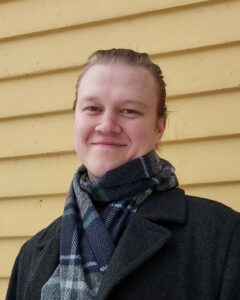 |
Joni Jaakola, postdoctoral researcherUniversity of Jyväskylä, Finland |
Joni Jaakola is a postdoctoral researcher at the Centre of Excellence in Research on Ageing and Care (CoE AgeCare) at the University of Jyväskylä, Finland. He defended his PhD thesis titled “Welfare technologies in Finland: An ethico-politics of hype, hope and experimentation” in 2023 at the University of Turku. His thesis focused on assessing the high expectations related to emerging welfare technologies. Having background in science and technology studies and the sociology of health and illness, Jaakola has published on issues concerning social robotics, telecare arrangements and vaccine hesitancy, usually with an ethnographic approach. Presently, Jaakola is interested in the domestication processes related to home care technologies.
Recent publications
Nurmi, J. and Jaakola, J. (2023) Losing Trust: Processes of Vaccine Hesitancy in Parents’ Narratives. Social Science & Medicine 331.
Jaakola, J. (2023) Risk and Uncertainty in Telecare: The Case of the Finnish ’Elsi’. Science & Technology Studies 36(2), 47–59.
Jaakola, J. (2020) Ethics by Other Means? Care Robot Trials as Ethics-in-Practice. Tecnoscienza 11(2), 53–72.
 Picture by Beate C. Koehler
|
Juliane Jarke, PhDUniversity of Graz |
Juliane is a Professor of Digital Societies at the University of Graz, Austria. Her research attends to the increasing importance of digital data in the public sector, education and for ageing populations. Theoretically and conceptually, her research is situated in the areas of critical data studies, new materialism and feminist STS. Between 2014 and 2022, Juliane worked as a postdoctoral researcher at the University of Bremen, Germany where she co-founded the university’s Data Science Center. Juliane received her PhD from Lancaster University, UK and worked there as research associate at the Centre for the Study of Technology and Organisation (2013/2014). She was a visiting research fellow at the Federal University of Minas Gerais, Brazil (February/March 2018) and the University of Bristol, UK (April/May and August/September 2022).
Recent publications
Manchester, H., & Jarke, J. (2022). Considering the role of material gerontology in reimagining technology design for ageing populations. In: International Journal of Ageing and Later Life, 15(2), 181-213. → full paper (open access)
Bischof, A. & Jarke, J. (2021). Configuring the Older Adult: Instances of Shaping Age and Ageing through Digital Technology Design. In: Peine, A., Marshall, B.L., Marting, W. & Neven, L. (Eds.) Socio-Gerontechnology – Interdisciplinary critical studies of age and technology. Routledge. Open Access → full paper
Jarke, J. (2020). Co-creating Digital Public Services for an Ageing Society. Evidence for User-centric Design. Series: Information Technology and Public Administration. Springer. → Open Access ebook
|
|
Unmil Karadkar, PhDScientist, Center for Interdisciplinary Research on Aging & Care, University of Graz, Austria |
Unmil Karadkar holds a PhD in Computer Science and works a Scientist at the Center for Interdisciplinary Research on Aging & Care (CIRAC) at the University of Graz, Austria. He blends techniques from Social, Information, and Computer Sciences to study the intersection of aging and technology, especially data. This includes data by and about older adults and the contexts in which such data are created, used, repurposed, and appropriated. Unmil is engaged in several communities related to Open Science initiatives and leads data governance activities for the Aging in Data project, a SSHRC-funded project that brings together scholars from ten countries as well as community-based activists and organizations, which explores how increasing data gathering is shaping our experiences of aging and care.
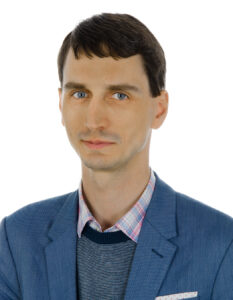 |
Andrzej Klimczuk, PhDWarsaw School of Economics, Poland |
Andrzej Klimczuk, PhD, a sociologist and public policy expert, assistant professor in the Department of Social Policy of the Collegium of Socio-Economics at the SGH Warsaw School of Economics, Poland. Editor and correspondent of publications about computer and video games in the years 2002-2009. In 2011-2013, Vice President of the Foundation’s Laboratory Research and Social Action “SocLab.” External expert of institutions such as the European Commission, URBACT Programme, Interreg CENTRAL EUROPE Programme, Fondazione Cariplo, and International Federation on Ageing. Member of various scientific organizations such as the International Sociological Association, European School of Social Innovation, International Political Science Association, European Citizen Science Association, and Human Development & Capability Association. Author of many scientific papers in the field of gerontology, labor economics, public management and social policy. He is a Sections Editor in the “Encyclopedia of Gerontology and Population Aging” (Springer Nature, Cham 2021). Scientific interests: population ageing (social gerontology, social policy, silver economy); development policy; regional policy; public management, governance; co-production of public services; social innovation and technological innovation; design management; alternative development; risk, trust, social capital; civil society, third sector, social economy
Recent publications
- Česnuitytė, V., Klimczuk, A., Miguel, C., & Avram, G. (Eds.) (2022). The Sharing Economy in Europe: Developments, Practices, and Contradictions. Cham: Palgrave Macmillan. https://doi.org/10.1007/978-3-030-86897-0
- Klimczuk, A., Klimczuk-Kochańska, M., & Felix, J. (Eds.) (2022). Social, Technological and Health Innovation: Opportunities and Limitations for Social Policy, Health Policy, and Environmental Policy. Lausanne: Frontiers Media. https://doi.org/10.3389/978-2-8325-0513-7
- Klimczuk, A. (2015 & 2017). Economic Foundations for Creative Ageing Policy (the two-volume set). New York, Basingstoke: Palgrave Macmillan.
 |
Viivi KorpelaDoctoral Researcher / Teacher
|
Viivi Korpela is a Doctoral Researcher at the Centre of Excellence in Research on Ageing and Care (CoE AgeCare), University of Jyväskylä, Finland. Her PhD, Signing in to Society: Reflections on Digital Skills, Support and Inclusion in Later Life, explores how older adults navigate digital transformation, acquire digital skills, and engage as digital citizens. Her research focuses on digital inclusion and digital citizenship, with a particular emphasis on informal and non-formal forms of digital support such as peer tutoring and family assistance.
Korpela’s work highlights the complexity of later-life digital engagement, introducing the concept of situational digital citizenship to describe how older adults selectively participate in or resist digital society. Across her publications, she has examined the role of family and friends in supporting digital skills, the dynamics of peer-led digital support, and older adults’ experiences with digital health services.
Her contribution to the field of socio-gerontechnology lies in foregrounding older adults’ voices and agency in technology-related debates, while also challenging binary discourses of digital inclusion/exclusion. She actively collaborates in Nordic and international projects on ageing, digitalization, and media literacy.
Recent publications
Korpela, V., Pajula, L., & Hänninen, R. (2024). Investigating the multifaceted role of warm experts in enhancing and hindering older adults’ digital skills in Finland. International Journal of Lifelong Education, 43(5), 509–522. https://doi.org/10.1080/02601370.2024.2353176
Korpela, V., Pajula, L., & Hänninen, R. (2023). Older Adults Learning Digital Skills Together: Peer Tutors’ Perspectives on Non-Formal Digital Support. Media and Communication, 11(3), 53–62. https://doi.org/10.17645/mac.v11i3.6742
Hänninen, R., Pajula, L., Korpela, V., & Taipale, S. (2023). Individual and shared digital repertoires– older adults managing digital services. Information, Communication & Society, 26(3), 568–583. https://doi.org/10.1080/1369118X.2021.1954976
 |
Klara Kümpfel, B.A.Goethe University Frankfurt |
Klara Kümpfel is an educational scientist who works as a student assistant at Goethe University Frankfurt and previously worked at the Research Institute Social Cohesion (RISC). Her areas of interest include life course transitions, ritual practices at the transition of becoming an adult as well as ethnographic fieldwork. Additionally, she engages with the theme of dying as a transition, focusing on ritual practices and on how mourning practices are being transformed through artificial intelligence. She completed her Bachelor’s degree at Martin-Luther-University Halle-Wittenberg and is currently studying at the University of Vienna.
Recent publications
Backhaus-Maul H., Hehl L., Kümpfel K. (2026). Jenseits der Wehrpflicht. Stochern im normativen Nebel eines “Gesellschaftsdienstes”. in: Walter A., Haas B., Kewes A., Mangold K., Schlicht, J. (Hrsg.): Umbruch, Druck, Transformation? Gegenwart und Zukunft des Engagements, Sonderband der Zeitschrift Voluntaris. Baden-Baden: Nomos, S. 377-388; https://www.inlibra.com/de/document/view/pdf/uuid/869322d4-04ea-3325-8627-dbfcf24d77d5?page=1&toc=5612435
 |
Lucia Landolfi, PhD StudentDepartment of Political and Social Sciences, University of Salerno |
She is a PhD student in Social Theory, Digital Innovation and Public Policies at the Department of Political and Social Studies of the University of Salerno. Sociologist with a master’s degree in Sociology, and a master’s degree in Social Informatics obtained at the University of Ljubljana.
She does research on aging, specifically on the relationship between doctor and elderly patient with Parkinson’s in the digital healthcare, considering the impact of digital healthcare on patient empowerment, which allows daily care and self-management of symptoms, and at the same time relieving their suffering and those of caregivers.
Her research interests include sociology of health, gender and generation studies and science and technology studies, qualitative research methods.
Recent publications
Cersosimo G., Landolfi L. and Marra P. (2022) “Socialità e benessere nell’universo dei bambini. Frammenti di vita quotidiana al tempo del Covid19” [Sociality and well-being in the children’s world. Fragments of daily life in the time of Covid19]. Ledizioni, Milano
Cersosimo G. & Landolfi L. (2021), “How social media maintained sociality in the pandemic”, Social Sciences, Law, 14(63) 1: 99-112, doi.org/10.31926/but.ssl.2021.14.63.1.10.
Csesznek C., Cersosimo G., Landolfi L. (2020) “New challenges for the elderly. A note on socialization to ICT’s as an opportunity in the time of the COVID-19.” REVISTA ROMÂNĂ DE SOCIOLOGIE. XXXI, (1-2): 49-58, https://www.revistadesociologie.ro/content/nr-1-22020-2
 |
Matthew Lariviere, PhD MPHLecturer in Social Policy, University of Bristol |
Dr Matthew Lariviere is Lecturer in Social Policy in the School for Policy Studies at the University of Bristol. Matthew is a social anthropologist whose teaching, research and scholarship examines the sociomateriality of digital technology and AI within futures of care and ageing. From 2018 – 2021, he held an ESRC Innovation Fellowship in the Centre for International Research on Care, Labour and Equalities at the University of Sheffield. In 2020, Matthew received a New Research Pioneers Award in recognition for this research on emergent technologies to support ageing in place awarded by the N8 Research Partnership, a consortium of the eight most research-active universities in the North of England.
Deeply committed to interdisciplinary and non-academic engagement, Matthew has presented his work to academics, policy and practice partners, and the public across the UK, Europe, Australia, and North America. He is the Chair and EU representative for IDIH Global’s Inclusive Living Expert Group, an international consortium and fora for digital technology and healthy ageing, and a Co-Convenor of the European Association of Social Anthropologists’ Age and Generations Network.
Matthew is an elected Fellow of the Royal Anthropological Institute and an Associate Fellow of the Higher Education Association.
Recent publications
Lariviere M, Poland F, Woolham J, Newman S & Fox C. (2021). Placing assistive technology and telecare in everyday practices of people with dementia and their caregivers: findings from an embedded ethnography of a national dementia trial. BMC Geriatrics 21, 121.
Nicholas, L., Donnellan, W., Lariviere, M., and Lewis, M. (2021) Lessons from lockdown: What next for online carer support? Mobilise Care Ltd: London.
Gathercole R, Bradley R, Harper E, Davies L, Pank L, Lam N, Davies A, Talbot E, Hooper E, Winson R, Scutt B, Montano VOrdonez, Nunn S, Lavelle G, Lariviere M, Hirani S, Brini S, Bateman A, Bentham P, Burns A, Dunk B, Forsyth K, Fox C, Henderson C, Knapp M, Leroi I, Newman S, O’Brien J, Poland F, Woolham J, Gray R & Howard R. (2021). Assistive technology and telecare to maintain independent living at home for people with dementia: the ATTILA RCT. Health Technology Assessment 25(19):1-156.
 |
Dr. Karin van LeersumOpen Universiteit |
I just started as a postdoc researcher of Alexander Peine on the theme artificial intelligence, in particular AI and old age (agism) and AI in healthcare. The project is still under development, but will explore how AI shapes and is shaped by new forms of practicing health, providing care, and remaining socially connected as we get older.
I was involved in the TOPFIT CitizenLab program at the University of Twente. This was a research and innovation program with a focus on citizen science. In addition to researching citizen science methodologies, I have researched how diverse groups of citizens integrate innovations and new forms of information and data into their daily lives.
In September 2021 I defended my PhD at Maastricht University. “What matters to me” – Research into preference elicitation for clients in need of long-term care. In 2015 I completed two masters at the University of Twente, Technical Medicine and Philosophy of Science, Technology and Society. Before I started my PhD, I was a research assistant in marine biology (project in the Seychelles) and cognitive neuroscience (at the University of Twente).
Recent publications
Bults, M., van Leersum, C.M., Olthuis, T.J.J., Bekhuis, R.E.M., den Ouden, M.E.M. (2023). Mobile health apps for control and self-management of Diabetes type 2: A qualitative study on users’ acceptability and acceptance. JMIR Diabetes. 8, [e41076]. http://doi.org/10.2196/41076.
van Leersum, C.M., Bults, M., Sloof, M., Pouwe, F., van Manen, J.G., Konijnendijk, A. (2021). Patiëntparticipatie bij de ontwikkeling en toepassing van e-health: Bereidheid en voorkeuren van mensen met diabetes mellitus type 2. Tijdschrift voor gezondheidswetenschappen. http://doi.org/10.1007/s12508-021-00313-y.
van Leersum, C.M., Moser, A. , van Steenkiste, B., Wolf, J.R.L.M., van der Weijden, T. (2021). Clients and professionals elicit long-term care preferences by using ‘What matters to me’: A process evaluation in the Netherlands. Health and Social Care in the Community. 00, 1-11. http://doi.org/10.1111/hsc.13509.
 |
Annette Leibing, PhD, ProfessorMunich Center for Technology in Society, Technical University of Munich |
Annette Leibing is a medical anthropologist (PhD U Hamburg, Germany), who had her first academic position at the Institute of psychiatry at the Federal U Rio de Janeiro. There she founded and directed, during five years, the CDA – a multidisciplinary centre for mental health and aging, with a special focus on dementia.
After a postdoctoral fellowship at McGill University (Dept. Social Studies of Medicine), she is now full professor at the Nursing faculty at Université de Montréal. Her research focuses on issues related to aging, by studying – as an anthropologist – Alzheimer’s and Parkinson’s disease, aging and psychiatry, pharmaceuticals, elder care and, stem cells for the body in decline, among others.
At the moment, her research focuses mainly on the prevention of dementia in different national and social contexts – undertaken in Canada, Germany, and Switzerland (and, part of a different project, also in Brazil). One focus of this project are digital biomarkers and preventive technologies.
Recent publications
Leibing, A. and Virginie Tournay (eds.). Les technologies de l’espoir: La fabrique d’une histoire à accomplir. Québec: PUL, 2010.
Leibing, A. and Silke Schicktanz (eds.). Preventing Dementia? Critical perspectives on a new paradigm of preparing for old age. New York/Oxford, UK: Berghahn, 2021
Leibing, A., Tournay V, Aisengart Menezes R et RF Zorzanelli – How to fix a broken heart: Cardiac disease and the ‘multiverse’ of stem cell research in Canada. BioSocieties 11(4): 435–457, 2016.
 |
Dr. Benjamin Lipp, PostdocMunich Center for Technology in Society, Technical University of Munich |
Benjamin is a sociologist by training and holds a doctorate in Science and Technology Studies from the Technical University of Munich. His research focuses on the manifold interconnections between information and communication technology (ICT) and healthcare. He is motivated by a conceptual interest in the techno-political condition of contemporary society, marked by attempts to ever more intimately interfacing technology and society, ICT and ageing. In his doctoral thesis, he has critically engaged with the European ageing-and-innovation discourse as well as with the techno-scientific practices of robotics innovation. From this, he has developed a conceptual framework of techno-politics that focuses on the relation between technology and contemporary political life. Many of today’s issues around ageing are thus configured by a new, overarching, decidedly techno-political rationality that views ICT, care, and older people as compatible. Enquiring into such claims is thus crucial in order to challenge and potentially re-wire the contemporary politics of ageing – and innovation. Motivated by this critical perspective, Benjamin engages the technical sciences on issues around responsibility, reflexivity, and co-creation. For example, he currently teaches within the MSc Programme on Neuro-Engineering and is part of the EU-funded research project SCALINGS, where he explores co-creative innovation processes in healthcare robotics.
Recent publications
Lipp, B. (2019). Interfacing RobotCare. On the Techno-Politics of Innovation. Doctoral thesis. Technical University of Munich.
Lipp, B., Maasen, S. (2019). Roboter in der Pflege als sozio-technisches Verschaltungs-problem. Theoretische Angebote der Technikforschung an die Pflege(wissenschaft). Pflege & Gesellschaft 24(3), 206–218.
Lipp, B. (2017). Analytik des Interfacing. Zur Materialität technologischer Verschaltung in prototypischen Milieus robotisierter Pflege. Behemoth 10(1). Freiburg, 107–129.
|
|
Li-Huei Liu, PhD |
I am a PhD candidate in Health Policy and Health Economics in the Department of Health Policy at The London School of Economics and Political Science (LSE). My PhD research is focused on frailty, health digitalisation, and depression among older people. I hope to explore how digital health technologies support frail older people in managing depression and provide policy implications for integrating digital engagement into frailty care plans. My other research interests include long-term care policy, health literacy, and health equity. I am eager to pursue further collaborative opportunities in these areas.
I received my BA degree in Public Administration from National Chengchi University (NCCU) and MSc degree in Health Policy and Management from National Taiwan University (NTU). Prior to my PhD in LSE, I worked as an assistant researcher in the Department of Long-term Care at Taiwan’s Ministry of Health and Welfare. After that, I joined research teams at NTU and NCCU, while also remotely participating in research projects of the Care Policy and Evaluation Centre (CPEC) in LSE. I am now affiliated with CPEC at LSE and NIHR Policy Research Unit in Healthy Ageing LSE team.
Recent publications
Liu, L.-H., Chung, K.-P., & Lai, Y.-C. (2024). Literature review of health equity indicators among Organisation for Economic Co-operation and Development countries or regions and Taiwan. Taiwan Journal of Public Health, 43(6), 537–550. https://doi.org/10.6288/TJPH.202412_43(6).113058
Liu, L.-H., & Chang, R.-E. (2022). Literature review of physical frailty, psychological (cognitive) frailty, social frailty, and multidimensional frailty. Taiwan Journal of Public Health, 41(4), 374–389. https://doi.org/10.6288/TJPH.202208_41(4).111044
Hung, Y.-C., Chen, K.-C., Chen, I.-F., & Liu, L.-H. (2022). A Study of the Key Sustainable Factors of Taiwan’s Community Care Centers. Sustainability, 14(3), 1413. https://doi.org/10.3390/su14031413
 |
Magdalena Kania Lundholm, PhDDalarna University, Sweden |
Magdalena Kania Lundholm is sociologist currently employed as Senior Lecturer at the School of Health and Social Studies, Dalarna University, Sweden. Her research combines sociology of communications and media, cultural sociology, critical internet studies, social theory and qualitative methods. Of particular interest are questions pertaining to digitalization as social change, digital inclusion and ICT (non)use among older people.
Recent publications
Kania-Lundholm, M. (2020, forthcoming). “The waves that sweep away: older ICT (non)-users’ experiences of digitalization”, in: Pentzold, C.Lohmeier, C., Kaun, A. (eds.), Beyond Chrono(dys)topias: Making Time for Digital Lives, Rowman & Littlefield.
Kania-Lundholm, M. (2019). “Slow side of the divide? Older non-users discussing social acceleration, social change and digital exclusion”, Special Issue on “Inequalities and Divides in Digital Cultures”, Digital Media & Society, 5(1):85-104.
Kania-Lundholm, M., Torres, S. (2018). “Ideology, power and inclusion: using the critical perspective to study how older ICT users make sense of digitization”, Media, Culture & Society, 40(8):1167-1185.
 |
Doris Lydahl, PhDUniversity of Gothenburg, Sweden
|
I am a researcher at the University of Gothenburg, Department of Sociology and Work Science, with an interest in questions regarding care practices, technologies of care and medicine, and the home as a place of care. My research interest lies in the intersection of sociology and STS. Currently, I lead a 3-year research project about welfare technologies, funded by Riksbankens Jubileumsfond. Welfare technology is the latest buzzword in Nordic health and welfare policy. It is imbued with hope to solve what has been called a twofold crisis of a rapidly ageing population on the one hand, and a care deficit on the other. In my explorative and ethnographic project I aim to explore the introduction of welfare technologies in Swedish municipal elderly care, with the aim to discern how care personnel and elderly persons interact with welfare technology, and what values and expectations about welfare, care work and technology are articulated.
Recent publications
Lydahl, D., Holmberg, S., Günther, K., & Ranta, J. (2020). Doing data together–affective relations and mobile ethnography in home visits. Qualitative Research, 1468794120917913.
Lydahl, D., & Hansen Löfstrand, C. (2020). Doing good: autonomy in the margins of welfare. Sociology of Health & Illness, 42(4), 892-906.
Lydahl, D. (2019). ‘It is not a pill’. Nordic Journal of Science and Technology Studies, 7(2), 4-14.
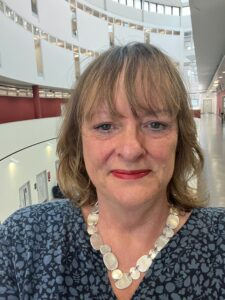 |
Wendy Martin, PhDBrunel University, UK |
Dr Wendy Martin is Senior Lecturer in the Department of Health Sciences, Brunel University London. Her research focuses on ageing, embodiment, the digital and everyday life. She is Co-Investigator for the Social Sciences and Humanities Research Council of Canada (SSHRC) international partnership ‘Ageing, Communication, Technologies (ACT): experiencing a digital world in later life’ and Collaborator for the SSHRC Insight Grant ‘Digital Culture and Quantified Aging’. Wendy is Co-Convenor of the British Sociological Association Ageing, Body and Society study group, member of the Executive Committee of the British Society of Gerontology, Co-Editor of the Routledge Handbook of Cultural Gerontology and a Founding Board member of the Socio-Gerontechnology Network (SGN).
Recent publications
Peine A, Marshall B, Martin W and Neven L. (2021) ‘Socio-gerontechnology – Key Themes, Future Agendas’ in Peine, Alexander, Marshall, Barbara, Martin, Wendy and Neven, Louis (editors) Socio-gerontechnology Interdisciplinary Critical Studies of Ageing and Technology. Abingdon. Routledge
Peine A, Marshall BL, Martin W, Neven L. editors (2021) Socio-gerontechnology Interdisciplinary Critical Studies of Ageing and Technology Abingdon. Routledge
Pilcher, K and Martin, W (2020) ‘Forever ‘Becoming’? Negotiating Gendered and Ageing Embodiment in Everyday Life’ Sociological Research Online. 25 (4) 698-717
 |
Ittay Mannheim, PhDPost-doctoral researcher, Department of Communication Studies, Ben Gurion University, Israel; Open University, The Netherlands |
Ittay Mannheim is a Social & Organizational Psychologist and social Geron-technology Researcher on ageing, ageism and digital technology. Currently, Ittay is a post-doctoral researcher at the Department of Communication Studies and ABC multidisciplinary robotics lab at Ben Gurion University, Be’er Sheva, Israel, and Open Universiteit, Heerlen, the Netherlands. Ittay’s dissertation entitled “Ageism in the Use and Design of Digital Technology” was completed at Tilburg University, the Netherlands, as part of the ‘EuroAgeism’ Innovative Training Network. He has previously worked at the Division for Research on Aging at the Myers-JDC-Brookdale Institute, where his work focused on loneliness, early detection of dementia, and legal guardianship. Ittay’s current research focuses on further investigating the manifestations of ageism in the use and design of digital technology, particularly in the context of assistive-social robots, datafication processes, interventions to reduce ageism and policy implications. More so, Ittay’s research makes use of a mixed-methods approach, working in trans-disciplinary teams and investigating the use of participatory design to promote equality and social change.
Recent publications
Ittay Mannheim, Hanna Köttl, Ageism and (Successful) Digital Engagement: A Proposed Theoretical Model, The Gerontologist, Volume 64, Issue 9, September 2024, gnae078, https://doi.org/10.1093/geront/gnae078
Vera Gallistl, Muneeb Ul Lateef Banday, Clara Berridge, Alisa Grigorovich, Juliane Jarke, Ittay Mannheim, Barbara Marshall, Wendy Martin, Tiago Moreira, Catharina Margaretha Van Leersum, Alexander Peine, Addressing the Black Box of AI—A Model and Research Agenda on the Co-constitution of Aging and Artificial Intelligence, The Gerontologist, Volume 64, Issue 6, June 2024, gnae039, https://doi.org/10.1093/geront/gnae039
Ittay Mannheim, Ageism in the use and design of digital technology: a theoretical model, Innovation in Aging, Volume 7, Issue Supplement_1, December 2023, Pages 834–835, https://doi.org/10.1093/geroni/igad104.2691
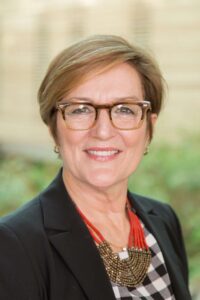 |
Josephine McMurray, PhDAssociate Professor, Lazaridis School of Business & Economics, Wilfrid Laurier University, Ontario, Canada |
Josephine’s interdisciplinary research focuses on the intersection of aging, health technology, and organizational systems, with a particular emphasis on how artificial intelligence and real-time location systems can improve the lives of older adults and help them to work and live more independently. Josephine’s work is exploring the socio-technical dynamics of AI-enabled technologies in healthcare, and how technologies can help to build more accessible workspaces for employees with cognitive impairments, such as mild cognitive impairment and dementia. Other research is exploring the role of shadow technologies in supporting age-inclusive workspaces. As Associate Scientific Director at AGE-WELL, she is committed to bringing a global perspective to solving some of the most pressing challenges faced by older adults and caregivers.
Recent publications
Grigorovich, A. & McMurray, J. (2024). Realising the promise of technologies for enhancing aging in place within long-term care homes. Healthcare Papers, 22(2), 58-64 [IF .0396][HI 26] https://pubmed-ncbi-nlm-nih-gov.proxy1.lib.uwo.ca/39324300/
Kokorelias, K.M., Grigorovich, A., Harris, M.T., Rehman, U., Ritchie, L., Levy, A., Denecke, K., McMurray, J. Kokorelias, K.M., Grigorovich, A., Harris, M.T., Rehman, U., Ritchie, L., Levy, A., Denecke, K., McMurray, J. (2024). Longitudinal Coadaptation of Older Adults With Wearables and Voice-Activated Virtual Assistants: Scoping Review. JMIR, 26: e57258 http://doi:10.2196/57258
McMurray, J., Levy, A., *Pang, W., Holyoke, P. (2024). Psychometric evaluation of a tablet-based tool to detect mild cognitive impairment in older adults: Mixed methods study. JMIR, 26:e56883b http://doi: 10.2196/56883 IF 5.175][HI 142]
 |
Prof. Dr. Anne MeißnerUniversity of Hildesheim |
Experienced scientist and practician in nursing and care with a demonstrated history of clinicial experience, academic research, higher education, and in the health care industry. Skilled in geriatric care, palliative care, technologies in care, and healthcare research. Strong operations professional with a Doctor of Philosophy (PhD) focused in Nursing Research from University Witten/Herdecke, Germany.
Anne’s research focuses on the implications of technologies in nursing and care. She’s interested in how technology is supporting nursing and care and asks questions about what part of care is technology able to complement in a sensible and pioneering path and how. Currently, she’s developing a MOOC for nurses to ensure digital competencies and enable 1.2 MIO nurses in Germany integrating technology beneficially in the service mission – or reject technology in justified cases. The MOOC innovatively uses badges, micro-learning units and AI (funded by the Federal Ministry of Education and Research, funding code 21INVI09).
She is interested in new ideas regarding research and teaching projects, creative collaboration, (to) discuss, find, create solutions for the challenges of today and of the future.
Recent publications
Meißner, A.; McNair, S. (2021): Ageing and technologies – Creating a vision of care in times of digitisation. Results of a fast-track process of the Joint Programming Initiative “More Years; Better Lives”. A paper for policy makers. https://doi.org/10.25528/060 (Open Access)
Meißner, A., & Kunze, C. (Ed.) (2021). Neue Technologien in der Pflege. Wissen, Verstehen, Handeln. Kohlhammer
Meißner, A. (Ed.) (2020): Ageing and technologies – Creating a vision of care in times of digitization. Results of a fast-track process of the Joint Programming Initiative “More Years, Better Lives”. https://dx.doi.org/10.25528/051 (Open Access)
|
|
Giulia Melis, PhD |
I am a postdoctoral fellow in Sociology at the University of Milano-Bicocca (Department of Sociology and Social Research) and adjunct lecturer in Sociology at the University of Cagliari (Department of Pedagogy, Psychological Sciences and Philosophy). My research focuses on life course and generations, especially the everyday practices of older adults and the social use of digital technologies. I pursue a gendered and life course perspective, that sheds light on biographical trajectories, the role of family, social ties and care responsibilities in shaping digital engagement in later life.
My methodological approach is grounded in qualitative and longitudinal research. I have experience with narrative interviews, online methods of data collection and the observation of everyday digital practices within different settings of use. I am currently interested in how digital public services are accessed, used, and negotiated by older adults, and how these interactions reflect broader social inequalities related to age, gender, and class, taking into account the role of public institutions in reproducing sociotechnical imaginaries that make little space for old age in digitised societies.
Recent publications
Pizzul, D., & Melis, G. (2024). “La digitalizzazione dei servizi alla prova della terza età”. In I quaderni di agenda digitale, Issue XVII(0017), pp.128-139, ISSN 2421-4167
Garavaglia, E., Caliandro, A., Melis, G., Sala, E., & Zaccaria, D. (2023). Contrasting ageism in research on older adults and digital technologies: A methodological reflection. In Digital ageism (pp. 248-265). Routledge.
Melis, G., Sala, E., & Zaccaria, D. (2022). Remote recruiting and video-interviewing older people: a research note on a qualitative case study carried out in the first Covid-19 Red Zone in Europe. International Journal of Social Research Methodology, 25(4), 477-482.
 |
Nil Meral, MRes & Doctoral ResearcherOpen Universiteit, The Netherlands |
I completed my bachelor in gerontology at Akdeniz University, Antalya, Turkey in 2020. Meanwhile, I did exchange studies during the undergraduate programme. First one was at Obirin University, Japan for a semester in 2017, then at Windesheim University of Applied Sciences, Zwolle, Netherlands for one academic year in 2018-2019. Thanks to study abroad period, my interest with different cultural context and life styles affect on ageing and gerontechnology was developed gradually. My bachelor dissertation was a qualitative study to explore digital engagement of Turkish 65+ Alzheimer family caregivers in Turkey. I completed my research master in gerontological sciences with my dissertation about exploring digital experiences of 50+ Turkish individuals in Belgium at Vrije Universiteit Brussel. Now, I just started my PhD as part of HOMeAGE MSCA-DN at Open University of the Netherlands Now, my focus is representation of diverstiy of older adult populations in ageing-in-place technologies during this programme.
Recent publications
Arun, Ö., Cobanoglu, D., Polat, G., Sahinkaya, G., Capkur, M., Meral, N., Keles, T. (2021). Rights Violations and Discriminatory Practices Against Older Persons During the Covid-19 Pandemic. Association for Aging Studies Publication.
 |
Naonori Kodate, PhDUniversity College Dublin, Ireland
|
Nao is not a robot (https://www.softbankrobotics.com/emea/en/nao) but an Associate Professor in Social Policy at University College Dublin, Ireland (UCD) and founding Director of UCD Centre for Japanese Studies (UCD-JaSt)! He holds a BA (International Relations) and LL.M from the University of Tokyo, MSc in European Politics and Policy, and a Ph.D in Political Science from the London School of Economics and Political Science. His research covers comparative public policy, and science, technology and society (STS), particularly in the use of eHealth (e.g. home care robots), patient safety, and gender equality in STEM.
He is currently the Principal Investigator of a two-year, Toyota Foundation-funded international research project “Harmonisation towards the establishment of Person-centred, Robotics-aided Care System (HARP: RoCS)”. The project compares policies and cultural aspects around the use of robotics-aided care for older people in Europe and East Asia. Nao is a founding member and on the Board of Councillors for the multidisciplinary group, Future Technologies for Integrated Care Research Network (FTIC), Japan. Nao is also affiliated to la Fondation France-Japon (FFJ), l’Ecole des Hautes Etudes en Sciences Sociales, UCD Centre for Interdisciplinary Research Education and Innovation in Health Systems (IRIS), and the Universal Accessibility & Ageing Research Centre in Japan.
Recent publications
Obayashi, K., Kodate, N., & Masuyama, S. (2020). Can connected technologies improve sleep quality and safety of older adults and caregivers? An evaluation study of sleep monitors and communicative robots at a residential care home in Japan. Technology in Society, online first, https://doi.org/10.1016/j.techsoc.2020.101318.
Obayashi, K., Kodate, N., & Masuyama, S. (2020). Measuring the impact of age, gender and dementia on communication-robot interventions in residential care homes. Geriatrics and Gerontology International 20(4): 373-378. DOI: 10.1111/ggi.13890 PMID: 32077237
Suwa, S., Tsujimura, M., Ide, H., Kodate, N., Ishimaru, M., Shimamura, A., & Yu, W. (2020). Home-care Professionals’ Ethical Perceptions of the Development and Use of Home-care Robots for Older Adults in Japan. International Journal of Human-Computer Interaction. 36 (14): 1295-1303. doi:10.1080/10447318.2020.1736809.
 |
Sanna Kuoppamäki, PhDTechnology in Health Care, Biomedical Engineering and Health Systems, KTH Royal Institute of Technology, Sweden |
Dr. Sanna Kuoppamäki is an Assistant professor in Technology in Health Care, Biomedical Engineering and Health Systems, KTH Royal Institute of Technology. She has a PhD in sociology and experience in interdisciplinary research in medical engineering and Human-Computer Interaction in the design and development of user-centric digital technologies for health and wellbeing.
Her research interests include the adoption, use and implementation of digital technologies in the everyday life of older adults, with a focus on understanding user’s needs, skills and intentions and detecting the mechanisms of care provision to optimise care delivery in a patient-centric way. Recently, she has investigated Digital Home Care systems supporting the wellbeing and ageing-in-place for older adults, and the design on Digital Kitchen Technologies from the user-centric perspective as a part of Human-Robot manufacturing.
Recent publications
Kuoppamäki, S., Östlund, B. (2020). Digital mobile technology enhancing social connectedness among older adults in Sweden. In: Gao Q., Zhou J. (eds) Human Aspects of IT for the Aged Population. Technologies, Design and User Experience. HCII 2020. Lecture Notes in Computer Science, vol. 12207. Springer, Cham.
Kuoppamäki, S. (2018). Digital participation in service environments among senior electricity consumers in Finland. Technology in Society, 55 111-118.
Kuoppamäki, S., Taipale, S., Wilska, T-A. (2017). The use of mobile technology for online shopping and entertainment among older adults in Finland. Telematics and Informatics, 34(4), 110-117.
 |
Gabrielle Lavenir, PhD candidateConcordia University
|
Gabrielle Lavenir is a PhD candidate in Concordia’s Social and Cultural Analysis program. Her research focuses on older people who play videogames, with an interest for what happens at the intersection of ageing and play, particularly in terms of subjectification and normativity. Her research also looks at the strategies of older adults who, stuck in the middle of several normative enterprises, still manage to make room for games.
Recent publications
Perks, M. E., Parker, F., Whitson, J. R., Simon, B., Lavenir, G., Yolgörmez, C., Browne, P., & Schram, B. (2019). Autonomy, Integration, and the Work of Cultural Intermediation in Indie Games. Media Industries Journal, 6(2). https://doi.org/10.3998/mij.15031809.0006.202
Lavenir, G., & Bourgeois, N. (2017). Older people, video games and the European French-language press : A topic model approach on a study about deviance, discipline and self-improvement. MedieKultur: Journal of Media & Communication Research, 33(63).
 |
Daniel López, PhDOpen University of Catalonia
|
Daniel López is Associate Professor of Social Psychology at the Open University of Catalonia. His work is placed at the intersection of Science and Technology Studies, Age Studies and Care Studies. His work is mainly devoted to the study of infrastructures and practices of care in later life, ranging from ICT-based systems such as telecare to community-led infrastructures such as senior cohousing or mutual-care initiatives. Theoretically, his work explores the biopolitics of aging and draws on Actor-network theory, poststructuralism and feminist technoscience. More recently, he got interested in self-tracking technologies, participatory sensing projects as well as maintenance and repair practices as infrastructural care. He is currently a board member of the Catalan Society for Geriatrics and Gerontology and senior researcher of the group CareNet at the Internet Interdisciplinary Institute (IN3/UOC).
Recent publications
López Gómez, D., Estrada Canal, M., & Farré Montalà, L. (2020). Havens and Heavens of Ageing-in-Community: Home, Care and Age in Senior Co-housing. In B. Pasveer, O. Synnes, & I. Moser (Eds.), Ways of Home Making in Care for Later Life (pp. 159-181). Singapore: Springer Singapore.
López Gómez, D. (2019). What if ANT wouldn’t pursue agnosticism but care? In A. Blok, I. Farías & C. Roberts (eds) The Routledge Companion to Actor-Network Theory, London; NY: Routledge.
López Gómez, D. (2015). Little arrangements that matter. Rethinking autonomy-enabling innovations for later life. Technological Forecasting and Social Change, 93, 91-101.
 |
Helen Manchester, PhDUniversity of Bristol
|
Helen Manchester is a Reader in Digital Inequalities and Urban Futures at the University of Bristol, UK. Helen is interested in digital exclusion, material cultures and re-imagining ‘care’. She develops methodologically innovative approaches to research, including co-design and co-creation, often working in interdisciplinary teams with artists, technologists, civil society organisations and policy-makers. Helen has led a number of Research Council UK funded projects, working with older people, including Tangible Memories: Community in care and Tangible Memories: Parlours of Wonder.
Recent publications
Manchester, H. and Barke, J. (2020) Regulating for careful knowledge production: researching older people, isolation and loneliness. In Mcdermont, M., Cole, T., Newman, J., & Piccini, A. Imagining Regulation Differently: co-creating regulation for engagement. Bristol: Policy Press.
Bates, V. L., Hickman, C., Manchester, H., Prior, J. & Singer, S., (2019) Beyond Landscape’s Visible Realm: Recorded sound, nature and wellbeing. Health and Place. (Available online 27 December 2019, https://doi.org/10.1016/j.healthplace.2019.102271)
Manchester, H. (2018) Objects of Loss: Resilience and Continuity in Material Culture Relationships in Newman, A., Davenport, B. & Goulding, A. (2018) Creative Practice in the Resilience of Older People. Connected Communities Series: Bristol: Policy Press.
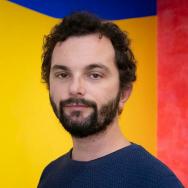 |
Francesco Miele, PhDUniversity of Trieste
|
Francesco Miele is a tenure track researcher at the Department of Political and Social Sciences of the University of Trieste. His main research interests regard the relationship between technology, care practices and organization. Over the last years he tackled research topics such as the algorithmization of care, the remote monitoring in people with chronic conditions, the invisible work of caregivers of elderly with multiple chronic conditions and the implementation of person-centered care models in long-term facilities. Most of his research focusses on health conditions interwoven with ageing processes, intended as long-standing process not limited to a specific phase of life. Methodologically speaking he uses ethnographic methods to explore the textures of practices that emerge around digital technologies in homecare and institutional contexts. He is currently principal investigator in a national project about the use of A.I. systems, with reference to robotic based and telecare applications in dementia care.
Recent publications
Miele, F. (2022). On care infrastructures and health practices: How people in health promotion programmes try to change their everyday life. Health, 13634593221093503. https://journals.sagepub.com/doi/abs/10.1177/13634593221093503
Miele, F. (2022). On the persistence of coercive practices in dementia treatment. When plans, spaces, and discourses matter. Rassegna Italiana di Sociologia, 63(4), 853-877. https://www.rivisteweb.it/doi/10.1423/106247
Miele, F., Neresini, F., Boniolo, G., & Paccagnella, O. (2022). Supportive care for older people with dementia: socio-organisational implications. Ageing & Society, 42(2), 376-408. https://www.cambridge.org/core/journals/ageing-and-society/article/supportive-care-for-older-people-with-dementia-socioorganisational-implications/DEA9C1808FE4B8F1C79FAE7208DECB31
 |
Louis Neven, PhDAvans University of Applied Sciences |
I am an interdisciplinary social scientist whose main interest is studying the relation between ageing and technology. I currently lead the Active Ageing research group at Avans University of Applied Sciences. In the past I have worked on the relation between ageing and robotics, nanotechnology, telecare and sustainable heating technologies. Along with the researchers of the Active Ageing “kenniskring”, I am currently involved in several projects which are all related to (practical) issues around innovations for older people. As such the Active Ageing research group serves as a hub between research, teaching and organisations and companies involved in care and innovation for older people. Questions that interest me are for instance how the ageing process is constructed and mediated by technologies; How gerontechnologies are designed and which (implicit) ideas are written into these technologies in this process; How older people respond to these technologies; How they (creatively) use or do not use these technologies and what practices and identities result from such (non-)use; How the needs, wants, roles and identities of older people can be understood in relation to technological design; And how we can translate such knowledge into various formats which are both useful and attractive for a design audience and for audiences of (future) professional care givers.
Recent publications
Bergschöld, J.M., Neven, L. and Peine, A. (2020), DIY gerontechnology: circumventing mismatched technologies and bureaucratic procedure by creating care technologies of one’s own. Sociol Health Illn, 42: 232-246. doi:10.1111/1467-9566.13012
Peine, A., Neven, L. (2018) From Intervention to Co-constitution: New Directions in Theorizing about Aging and Technology. The Gerontologist. 2018-5. (online ahead of print).
Neven, L., Peine, A. (2017) From Triple Win to Triple Sin: How a Problematic Future Discourse is Shaping the Way People Age with Technology. Societies, 7-3, 26.
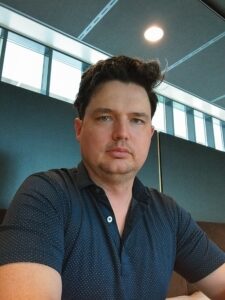 |
Artur V. Nikulkin, PhDOpen University Netherlands (OU) |
Dr. Artur Vlas Nikulkin (n. Holavins) is a postdoctoral researcher at the Open University Netherlands (OU), studying social adoption of technologies in long-term care for older adults in Limburg province of the Netherlands, both in institutional and home environments. Before joining the OU, dr. Nikulkin has worked as a patient participation researcher at Health, Ethics and Society department of the Maastricht University. He received his PhD in Social Sciences (dr.soc.sc.) from the University of Helsinki (Finland), defending a dissertation on participatory care for older adults by non-governmental organisations in Russia. The study focused on reasons why independent active ageing-promoting NGOs, state-dependent self-help veteran support groups, and volunteers shift between top-down objectifying practices and client-centred participatory collaborations in their organization and provision of medical and social care. Dr. Nikulkin also supported studied organisations with policy advice and project evaluations, including assessment of technological innovations, such as telemedicine for elderly in remote villages in North-West Russia. With the focus on socio-ontological understanding of public participation in health and care, dr. Nikulkins contributes to the field of socio-gerontechnology with analysis of informal practices, third sector professionalization, and non-democratic situations.
Recent publications
Nikulkin, V., van Leersum, C. M., & Peine, A. (2025). Key users and the creation of everyday relations with digital technologies in care. SSM-Qualitative Research in Health, 7, 100547.
Nikulkin V, Zvonareva O. (2024) The Trading Zones of Patient Participation: Public Issue Formation in Nondemocratic Situations. Science, Technology, & Human Values.
Nikulkin V, Zvonareva O. (2024) Formatting patient knowledge and channelling participation: how patient organisations work under authoritarianism. BioSocieties.
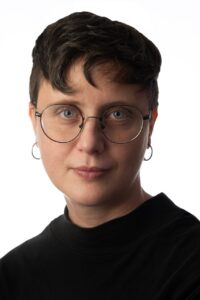 |
Mino Novello, PhdSocial Policy Lab, Department of Architecture and Urban Studies, Politecnico di Milano |
Mino earned a PhD in Applied Sociology and Methodology of Social Research at the University of Milano-Bicocca, focusing on mixed methods in social inquiry. Their current research addresses the digitisation of public services and risks of social exclusion for older adults. Generally, their research interests cover social inequalities, such as health, gender, and digital inequalities, within ageing societies. Previously, they participated in interdisciplinary projects on e-health and family well-being and contributed to research on school-to-work transition in Italy. Since 2023, they have been a member of the research group Ageing Societies (https://ageingsocieties.unimib.it/). In 2025 they have been a visiting scholar at the Internet Interdisciplinary Institute (IN3) of the Universitat Oberta
de Catalunya within the Communication Networks & Social Change (CNSC) research group.
Recent publications
Decataldo, A., Paleardi, F., Lauritano, G., Figlino, M. F., Russo, C., Novello, M., Fiore, B., Ciuffo, G., & Ionio, C. (2025). Preventing Premature Family Maladjustment: Protocol for a Multidisciplinary eHealth Study on Preterm Parents’ Well-Being. JMIR Research Protocols, 14(1), e63483. https://doi.org/10.2196/63483
Niccodemi, G., Gaia, A., Novello, M., & Consolazio, D. (2025). Internet use and physical and mental health in old age during the COVID-19 pandemic: Evidence from partners in SHARE. Economics & Human Biology, 57, 101487. https://doi.org/10.1016/j.ehb.2025.101487
Novello, N. (2023). Communities of Scholars and Mixed Methods Research: Relationships Among Fields and Researchers. Forum Qualitative Sozialforschung / Forum: Qualitative Social Research, 24(1), Articolo 1. https://doi.org/10.17169/fqs-24.1.4008
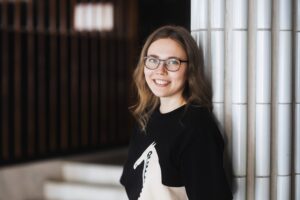 |
Laura Pajula, Doctoral researcherCentre of Excellence in Research on Ageing and Care, Department of Social Sciences and Philosophy, University of Jyväskylä |
Laura Pajula, MSc, is a Doctoral Researcher at the Centre of Excellence in Research on Ageing and Care in the Department of Social Sciences and Philosophy at the University of Jyväskylä. Her work focuses on older adults’ digital inclusion, with particular emphasis on digital public services, co-design and enhancing access on social and societal level. Pajula has comprehensive experience from project work and cross-sectional collaboration at the intersection of aging and digitalization. She is currently working on the DigiIN project (Towards Socially Inclusive Digital Society: Transforming Service Culture) funded by the Strategic Research Council.
Recent publications
Korpela, V., Pajula, L., & Hänninen, R. (2024). Investigating the multifaceted role of warm experts in enhancing and hindering older adults’ digital skills in Finland. International Journal of Lifelong Education, 1–14. https://doi.org/10.1080/02601370.2024.2353176
Pajula, L., Korpela, V. & Hänninen, R. (2023). Digitaalinen yhteiskunta ja ikääntyneet: Kohti yhdenvertaisuutta. Politiikasta.fi. https://politiikasta.fi/digitaalinen-yhteiskunta-ja-ikaantyneet-kohti-yhdenvertaisuutta/
Hänninen, R., Pajula, L., Korpela, V., & Taipale, S. (2023). Individual and shared digital repertoires – older adults managing digital services. Information, Communication & Society, 26(3), 568–583. https://doi.org/10.1080/1369118X.2021.1954976
|
|
Edit Pauló, PhD studentELTE Eötvös Loránd University, Budapest, Hungary |
Edit Pauló holds an MA in Sociology and an MSc in Business and Economics and is currently pursuing her PhD in Sociology at Eötvös Loránd University (ELTE), Budapest. She is in the third year of her doctoral studies and is currently working on the empirical phase of her research. Her research focuses on ageing and digitalisation, with particular interest in the social media practices of older adults, using a mixed-methods approach including content analysis, in-depth interviews, and quantitative analysis of digital trace data. Edit teaches at ELTE and Milton Friedman University, both located in Budapest, Hungary, where she teaches undergraduate and graduate courses in sociology, social psychology, and research methods. She has been awarded both the University Research Scholarship and the New National Excellence Programme Scholarship for her academic achievements.
Recent publications
Pauló, E. (2025). Older TikTokers in Digital Capitalism: Construction of Persona and Agency. (2025). Persona Studies, 11. https://doi.org/10.21153/psj2025vol11noart2177
 |
Alexander Peine, PhDUtrecht University
|
I am a Full Professor of Culture, Innovation and Communication at the Open University of The Netherlands. My research links two pertinent societal developments – (i) population ageing, including the challenges it allegedly poses for care and health systems, and (ii) technological change, including the push towards more interactive and “smarter” technologies. In simple terms, one could say I study what population ageing means for the way we organise and direct technology and innovation, and, vice versa, how technology and innovation have come to shape how we age and how we imagine the future of health and care. My work has expanded the usual drive in this area to think of technologies as interventions, and has developed instead a unique line of research that thinks of ageing, care and health as being co-constituted with technology. Before joining the Open University NL, Alexander was an Associate Professor at Utrecht University, the laureate of a prestigious Max Weber post-doctoral fellowship at the European University Institute (EUI) in Florence, and a Principal Investigator at Berlin University of Technology.
Recent publications
Lipp, B., and A. Peine (2022). Ageing as a Driver of Progressive Politics? What the European Silver Economy Teaches Us About the Co-Constitution of Ageing and Innovation. Ageing and Society, forthcoming, 1-13.
Peine, A., B. L. Marshall, W. Martin, and L. Neven, (eds.) (2021). Socio-Gerontechnology — Interdisciplinary Critical Studies of Ageing and Technology. London: Routledge.
Peine, A., & Neven, L. (2020). The Co-constitution of Ageing and Technology – A Model and Agenda. Ageing & Society, 41 (12), 2845-2866.
 |
Arianna Poli, MAPh.D. student in Ageing and Later Life at the Division Ageing and Social Change (ASC), Linköping University, Sweden
|
Her research lies in the field of social gerontology, particularly at the intersection of ageing, inequality, and new technologies. Arianna investigates digital technologies as possible contributing factors to increased risk of exclusion and social inequalities among older people. In her Ph.D. work, she aims at understanding the link between inclusive participation of older people in research on digital technologies and the inclusiveness of new digital-based services among older people. Before joining Linköping University and ASC, Arianna worked at the Italian National Institute of Health and Science on Ageing (INRCA), at the Centre for Socio-Economic Research on Ageing where she had worked in European research projects, like INNOVAGE (GA 306058). Arianna has been a member of the ROSEnet COST Action (CA 15122) Reducing Old-Age Social Exclusion (2016-2020). She is currently affiliated to the Swedish National Graduate School on Ageing and Health (SWEAH) and involved in the Communication Committee of the Socio-Gerontechnology Network.
Recent publications
Poli, A., Kelfve, S., Klompstra, L., Strömberg, A., Jaarsma, T., Motel-Klingebiel, A. (2020). Older People in Digital Health Research: What Predicts (Non-)Participation in an Exergame Intervention Study. J Med Internet Res (forthcoming). doi:10.2196/17884.
Allemann, H. & Poli, A. (2020). Designing and evaluating information and communication technology-based interventions? Be aware of the needs of older people. European Journal of Cardiovascular Nursing. doi:10.1177/1474515119897398.
Poli, A., Kelfve, S. & Motel-Klingebiel, A. (2019). A research tool for measuring non-participation of older people in research on digital health. BMC Public Health, 19(1), 1487.
 |
Katja Antonia RießenbergerBavarian Research Centre for Digital Care (BZPD) at University of Applied Sciences Kempten, Germany |
Katja Antonia Rießenberger is a doctoral student at the Dept. of Science Technology and Society (STS) at Technical University of Munich (TUM). As a former research associate at the Institute for Ageing Research (IAF) at the Eastern Switzerland University of Applied Sciences (OST), she is now working at the Bavarian Research Centre for Digital Care (BZPD) at University of Applied Sciences Kempten, Germany. She completed her bachelor’s degree in Social Work, specializing in intergenerational Social Work, in Germany and Finland. She then proceeded as a Fulbright scholar with her M.Sc. in Social Work, specializing in Gerontology, at the University of Louisville in Kentucky, USA. Here she received inter alia the Profiles in Leadership Award 2019, the Dean’s Citation Award, as well as the Honor’s Graduate Award.
Since 2019, Katja A. Rießenberger is involved in research projects using participatory design, qualitative research methods as well as co-creation methods to develop Gerontechnologies. In 2022 she was awarded with the Best Position Paper Award at the ICT4AWE conference. Her research interests include inter alia ethical, technical, and social challenges of age(ing) in the field of Gerontechnology, intersectionality with a focus on age and gender aspects, and topics of public health.
Recent publications:
Rießenberger, K. A., Hüsler S., Bruggmann A., Eicher S., Stulens L., Misoch S. (2022). WisdomOfAge: Developing a Seniors Digital Platform for Knowledge Transfer through Participatory Design. Position Paper accepted at the ICT4AWE conference. [Best Position Paper Award]
Mucha, H., Correia de Barros, A., Benjamin, J., Benzmüller, C., Bischof, A., Buchmüller, S., de Carvalho, A., Dhungel, A., Draude, C., Fleck, M., Jarke, J., Klein, S., Kortekaas, C., Kurze, A., Linke, D., Maas, F., Marsden, N., Melo, R., Michel, S., Müller-Birn, C., Pröbster, M., Rießenberger, K., Schäfer, M., Sörries, P., Stilke, J., Volkmann, T., Weibert, A., Weinhold, W., Wolf, S., Zorn, I., Heidt, M. & Berger, A. (2022). Collaborative Speculations on Future Themes for Participatory Design in Germany. i-com, 21(2), 283-298. https://doi.org/10.1515/icom-2021-0030
Pisla D., Nae L., Vaida C., Oprea E., Pisla A., Gherman B., Antal T., Riessenberger K., Plitea N. (2021). Development of a Learning Management System for Knowledge Transfer in Engineering. Technical University of Cluj-Napoca, ACTA TECHNICA NAPOCENSIS, 64-3.
Rießenberger, K. A. (2021). Participatory Design and the Divide between Developers and Older Adults. In: Wienrich, C., Wintersberger, P. & Weyers, B. (Hrsg.), Mensch und Computer 2021 – Workshopband. Bonn: Gesellschaft für Informatik e.V.. DOI: 10.18420/muc2021-mci-ws06-249
 |
Leigh RooneyUniversity of York |
Leigh Rooney is a UK-based qualitative researcher whose work explores the assembling of key concepts within adult social care, including social care innovations, research capacity, and ‘need’ in assessment processes.
Currently based in the Older Adults Social Care Research Group at the University of York, Leigh works on the Curiosity Partnership, a research capacity-building initiative in adult social care. His previous projects have included examining innovations in homecare, with a focus on how technologies emerge, stabilise, and circulate within policy and practice.
Recent publications
McAnuff, J., Rapley, T., Rooney, L., & Whitehead, P. (2024). Navigating uncharted territory with a borrowed map: lessons from setting up the BATH-OUT-2 randomised controlled trial in adult social care and housing services in English local authorities. Trials, 25(1), 1-9.
Rooney, L., Rapley, T., & Whitehead, P. J. (2023). Normative puzzles for local government: Managing the introduction of single‐handed care in England. Sociology of Health & Illness, 45(4), 718-33. DOI: 10.1111/1467-9566.13618
Whitehead, P.J., Rooney, L., Adams‐Thomas, J., Bailey, C., Greenup, M., Southall, C., Raffle, A., Rapley, T., & Whittington, S. (2022). ‘Single‐handed care’ initiatives and reviews of double‐handed homecare packages: A survey of practices in English local authorities with adult social care responsibilities. Health & Social Care in the Community, 30(6), e5560-e5569. DOI: 10.1111/hsc.13980
|
|
Andrea RosalesAssociate Professor Universitat Oberta de Catalunya |
Andrea Rosales is an Associate Professor of Communication Studies at the Universitat Oberta de Catalunya, specializing in data analytics and data visualization. Her research focuses on the challenges of datafied societies and the impact of stereotypes and design biases on automated systems. She examines how these factors affect human rights, particularly with regard to ageism, and how automated systems deprioritize, disregard, or disempower minorities and disadvantaged groups by failing to account for their values, interests, and habits.
Recent publications
Rosales, A., & Linares-Lanzman, J. (2025). Latet Anguis in herba: Unveiling ageism of generative Ai. AoIR Selected Papers of Internet Research. https://doi.org/10.5210/spir.v2024i0.14049
Rosales, Andrea., & Suárez-Gonzalo, Sara. (2024). Peter’s Problem. An Analysis of the Imaginaries about Automated Futures Portrayed in QualityLand. 37–54.
Rosales, Andrea., Fernández-Ardèvol, Mireia., & Svensson, Jakob. (2023). Digital Ageism: How it operates and approaches to tackling it (A. Rosales, M. Fernández-Ardèvol, & J. Svensson, Eds.). Routledge.
 |
Javiera Rosell, PhDDepartment of Psychology, Faculty of Social Sciences, Universidad de Chile
|
Javiera Rosell is based in Santiago – Chile and actively participates in the field of gerontology, focusing her work on the psychological aspects of
aging. She is currently an Assistant Professor in the Department of Psychology at the Universidad de Chile. Her research interests include the impact of technology on the psychological well-being of older adults. She also explores ageism and its influence on quality of life in later life, particularly in relation to Internet use. Currently, she is leading a project on problematic Internet use among older adults.
Javiera is a academic visitor at the Oxford Institute of Population Ageing and member of the Latin American Research Network of the Institute (LARNA). Also, she is a young researcher in the Millennium Institute for Care Research
(MICARE).
Latest publications
Rosell, J., Sepúlveda-Caro, S., Bustamante, F. (2024). Educational Gerontechnology: Toward a Comprehensive Model for the Education of Digital
Technologies for Older Adults. In: Gao, Q., Zhou, J. (eds) Human Aspects of IT for the Aged Population. HCII 2024. Lecture Notes in Computer Science, vol 14725. Springer, Cham. https://doi-org.pucdechile.idm.oclc.org/10.1007/978-3-031-61543-6_20
Rosell, J., Vergés, A., Torres Irribarra, D., Sepúlveda-Caro, S., & Flores, K. (2022). Motives of Use and Internet Addiction: Development and Evidence of Validity of a Scale to Evaluate Motives of Internet Use. *International Journal of Mental Health and Addiction*. https://doi.org/10.1007/s11469-022-00769-2
Rosell, J., & Vergés, A. (2023). Loneliness as a Potential Mechanism of the Association Between Ageism and Mental Health Outcomes in the Chilean Context. *Journal of Applied Gerontology*, *42*(6), 1245–1254. https://doi.org/10.1177/07334648231158484
Rosell, J., Vergés, A., Miranda-Castillo, C., Sepúlveda-Caro, S., & Gómez, M. (2022). Predictors, types of Internet use, and the psychological well-being of older adults: A comprehensive model. *The Journals of Gerontology: Series B*. https://doi.org/10.1093/geronb/gbac054
 |
Tomás Sánchez Criado, PhDOpen University of Catalonia |
Ramón y Cajal Senior Researcher Fellow at the CareNet-IN3 group of the Open University in Catalonia. Working at the crossroads of Anthropology and STS, he has developed a particular concern around how bodily diversity – paying special attention to disabled and older people – comes to matter in the knowledge, material and care politics of participatory city-making. He is currently working on a book project on these topics, drawing from ethnographic and archival materials from the city of Barcelona and his experiments in architectural design studio projects in Germany, tentatively titled “An Uncommon City: Bodily Diversity and the Activation of Possible Urbanisms”. In his work, he has also been experimenting with different forms of public engagement, ethnography and pedagogy. He has recently co-edited Experimental Collaborations: Ethnography through Fieldwork Devices (Berghahn, 2018) and An Ethnographic Inventory: Field Devices for Anthropological Inquiry.
Recent publications
López, D. & Criado, T.S. (2021, forthcoming). Civilising technologies for an ageing society? The performativity of participatory methods in Socio-gerontechnology. In A. Peine, W. Martin, B. Marshall & L. Neven (Eds.), Socio-gerontechnology – Interdisciplinary critical studies of ageing and technology. London: Routledge.
Duclos, V., & Criado, T.S. (2020). Care in Trouble: Ecologies of Support from Below and Beyond. Medical Anthropology Quarterly, 34(2), 153–173.
Criado, T.S. (2019). Technologies of Friendship: Accessibility politics in the ‘how to’ mode. The Sociological Review, 67(2): 408–427
 |
Alexander Seifert, PhDUniversity of Zurich and FHNW
|
Dr. Alexander Seifert is a sociologist and gerontologist interested in the contextual factors of aging. He is a division manager of the Research Department at the Centre of Competence for Gerontology at the University of Zurich. Furthermore, he works at the School of Social Work at the University of Applied Sciences and Arts Northwestern Switzerland in Olten. His research interests include social science approaches to the topics of age (aging), housing, technology/digitization, and lifestyles. For example, he conducted the Swiss national studies “Digital Seniors” (2010, 2015, 2020) in Switzerland and explored the subjective feelings of social exclusion regarding the non-use or less-use of modern technologies and the internet within a Swiss National Science Foundation-funded national study. He is competent in both qualitative and quantitative methods with a focus on mobile data collection with smartphones in recent years. Alexander Seifert is accustomed to working in interdisciplinary and international projects and has been involved in numerous successful project proposals. He has been a member of the Socio-Gerontechnology Network since 2018.
Recent publications
Schlomann, A., Seifert, A., Zank, S., Woopen, C., & Rietz, C. (2020). Use of information and communication technology (ICT) devices among the oldest-old: Loneliness, anomie, and autonomy. Innovation in Aging, 4(2), igz050. https://doi.org/10.1093/geroni/igz050.
Seifert, A., Hofer, M., & Rössel, J. (2018). Older adults’ perceived sense of social exclusion from the digital world. Educational Gerontology, 44(12), 775–785. https://doi.org/10.1080/03601277.2019.1574415.
Seifert, A., & Schelling, H. R. (2018). Seniors online: Attitudes toward the internet and coping with everyday life. Journal of Applied Gerontology, 37(1), 99–109. https://doi.org/10.1177/0733464816669805
 |
Sara SkardellyDoctoral Researcher |
Sara Skardelly, MSc, is a doctoral researcher at the University of Graz in Austria, based at the BANDAS (Business Analytics and Data Science) Centre. She is interested in care and ageing, as well as the role of communicative AI (such as voice assistants and chatbots) in shaping sociodigital futures. She employs a range of methods—from speculative and participatory approaches to novel quantitative mapping techniques. Sara has worked in interdisciplinary and international teams, contributing, for instance, to MemorAI Styria, which explored neurotechnologies in dementia care. She is currently part of ComAI, working on the subproject Health: Care through Communicative AI, led by Prof. Dr. Juliane Jarke.
|
|
Dr. Maria SourbatiSchool of Art and Media, University of Brighton, UK |
Dr Sourbati’s expertise combines communication policy, digital media and older people, smart mobility, and age relations. Her research explores the social and policy dimensions of digital technology adoption, with a particular focus on age relations and the lived experiences of older people. She investigates the tensions between top-down, policy-driven diffusion of digital innovations and locally situated engagement with ICTs. Dr Sourbati’s current work examines the societal implications of emerging technologies, especially in relation to mobility, age, and data. She has secured funding from national and international research councils, local authorities, and not-for-profit organisations.
She is currently the UK lead for the AGEAI study, a multi-country research project examining discourses and practices surrounding the deployment of Artificial Intelligence systems and services in Germany, the Netherlands, Poland, Spain, and the UK. Within AGEAI, her research focuses on: Older adults’ experiences and perceptions of smart mobility in urban environments, including how they interpret AI in mobility contexts and how data on their movement and travel is collected; The assumptions embedded in the design of smart mobility services, and how age and (in)equalities are constructed and reflected within these systems.
Dr Sourbati’s work has been widely published in high-impact, peer-reviewed journals, books, and international conferences. She has been invited to contribute to policy workshops hosted by national governments and the Council of Europe.
Recent publications
Sourbati, M., Stypińska, J. (2025). Upskilling the Old, a Quarter Century on: Media Literacies, AI and Older People in Public Policy Discourses. In: Gao, Q., Zhou, J. (eds) Human Aspects of IT for the Aged Population. HCII 2025. Lecture Notes in Computer Science, vol 15811. Springer, Cham. https://doi.org/10.1007/978-3-031-92712-6_14
Sourbati, M (2023) Age bias on the move: The case of smart mobility. In A. Rosales, M. Fernández-Ardèvol, & J. Svensson (Eds.), Digital Ageism. How it Operates and Approaches to Tackling it. Routledge. [Open access]
Sourbati, M., & Behrendt, F. (2021). Smart mobility, age and data justice. New Media & Society, 23(6), 1398-1414. https://doi.org/10.1177/1461444820902682 [Open access]
 |
Randi Stokke, PhDUniversity of Edinburgh |
I am a registered nurse and pedagogue with a PhD in public service innovation. My main area of interest comprises ageing and technologies in municipality caring services. Other areas of interest are service research in caring services, welfare technology, telecare, public service innovation, healthcare, caring, and learning in higher education with a special focus on simulation in learning.
I am trained mainly in qualitative methodology and has experience of interdisciplinary research with an interest in the intersection of care research, service innovation research and Science and technology studies (STS).
I am the leader of the research group at NTNU in Gjøvik: Service research, innovation and technology in care.
Recent publications
Stokke, Randi. (2018) Older people negotiating independence and safety in everyday life using technology: Qualitative study. Journal of Medical Internet Research. vol. 20 (10).
Stokke, Randi. (2017) “Maybe we should talk about it anyway”: a qualitative study of understanding expectations and use of an established technology innovation in caring practices. BMC Health Services Research. vol. 17 (1).
Stokke, Randi. (2016) The personal emergency response system as a technology innovation in primary health care services: An integrative review. Journal of Medical Internet Research. vol. 18:e187 (7).
 |
Věra Suchomelová, Th. D.Department of Education, University of South Bohemia |
Věra Suchomelová, Th.D. finished her master’s degree at the Faculty of Theology at the University of South Bohemia in České Budějovice (Czech Republic). In 2015, she finished her doctoral studies in theology, specializing in pastoral theology. Her research focuses on spirituality and spiritual needs in old age, aging, and pastoral care in nursing homes. She is the author of the monograph “Seniors and Spirituality: Spiritual Needs in Everyday Life”. Currently, she is a main researcher in the multidisciplinary project VIREAS (Virtual Reality in Keeping the Elderly Active). In the Faculty of Theology, she works as a senior lecturer at the Department of Education. She teaches both theoretical and practical courses related to well-being in old age and spirituality in social work. She also participates in courses within the University of Third Age and lifelong learning for social workers. As a certified memory coach, she leads courses for older adults.
Recent publications
Suchomelová, V., Tetourová, R., Lhotská L., Husák J., Kotek M., & Stejskal J. (2022). Virtual reality and its use in care homes and beyond.
Suchomelová, V., Lhotská, L., Husák, J. (2021). Virtual Reality as a Tool for Keeping the Elderly Active: Selected Issues. In H. Georgi (Ed.), Ageing 2021: Proceedings of the 5th Gerontological Interdisciplinary Conference (pp.160-167). Prague College of Psychosocial Studies.https://www.konferencestarnuti.cz/files/Starnuti_2021_sbornik.pdf
Suchomelová, V., Moya Faz, J.F. (2021). Spirituality in Old Age in: Rainer B. Gehrig, Michal Opatrný, Nándor Birher, Klaus Baumann et al: Spirituality, Ethics and Social Work, FreiDok plus, s. 302 – 31.
 |
Sugahara, GustavoDINÂMIA’CET-IUL, Portugal and Oslo Metropolitan University, Norway. |
Gustavo Sugahara, PhD, is Integrated Ph.D Researcher at DINÂMIA’CET-IUL and lecturer at the Oslo Metropolitan University (OsloMet). The subject of urban ageing is his main career focus. His master’s thesis concluded at ISCTE-IUL in 2010, dealt with the theme of creative cities in the face of population ageing, then, in his Ph.D., concluded in 2019 at the OsloMet, he addressed the theme of urban ageing and its impact on social policies, with critical gerontology as the main theoretical framework of this work. Currently, he is using critical gerontology lenses and co-constructed action-oriented methodologies to investigate the presumptions and cultural imaginaries about ageing and old age that are embedded within stories surrounding Artificial Intelligence. Ultimately, the goal is to understand how AI can be used to reshape society’s relationship with ageing and old age.
Recent publications
SUGAHARA, G., Matos, M. (2024) ” Involving the community in ageing policy design: The Cascais Protocol” in Linking Ages – A dialogue between childhood and ageing research, Routledge. https://www.taylorfrancis.com/chapters/oa-edit/10.4324/9781003429340-34/involving-community-ageing-policy-design-gustavo-sugahara-marta-os%C3%B3rio-de-matos?context=ubx&refId=759b789a-1081-4d65-9a9e-846f5faa35e3
SUGAHARA, G., Nordvik, V.; (2020). “Knitting alone – in the city – ageing and kinship availability as a vulnerability marker.”, Nordic Social Work Research https://doi.org/10.1080/2156857X.2020.1782253
SUGAHARA, G. (2017), “A Critical Approach to the Demographics of Ageing: The Case of Oslo.”, Cidades, Comunidades e Territórios, 35 (2017), pp. 1 – 26 doi: 10.15847/citiescommunitiesterritories.dec2017.035.art01
 |
van Hees, Susan PhDUniversity of Utrecht |
Dr Susan van Hees finished her PhD in 2017 at Maastricht University. In her dissertation she explored how an ageing-in-place policy in the Netherlands worked out in practice, focusing on the tensions between policy ideals, professional care and welfare practices, and experiences of older adults. As a postdoctoral researcher at Tilburg University, she investigated after her PhD study how older adults’ perspectives can be embedded structurally in a knowledge infrastructure, more specifically, i.e., how the co-construction of applied academic studies can be organized to mutually benefit older adults, care organisations and academia. Currently Susan works as a postdoctoral researcher at the Copernicus Institute of Sustainable Development, Utrecht University. She studies valuation practices, by unpacking how values are being co-constituted in health innovations, more specifically in innovations related to the development of smart(er) living homes environments for older people throughout Europe. By facilitating the organizing of co-creation sessions with stakeholders, meanings of values and valuation dynamism are being studied. Co-creation, public engagement, valuation practices and meaningful ageing and citizenship, are some core concepts in her work
Recent publications
van Hees, S., Horstman, K., Jansen, M., & Ruwaard, D. (2017). Photovoicing the neighbourhood: Understanding the situated meaning of intangible places for ageing-in-place. Health & place, 48, 11-19.
van Hees, S., Horstman, K., Jansen, M., & Ruwaard, D. (2018). Meanings of ‘lifecycle robust neighbourhoods’: constructing versus attaching to places. Ageing & Society, 38(6), 1148-1173.
van Hees, S., Horstman, K., Jansen, M., & Ruwaard, D. (2015). Conflicting notions of citizenship in old age: An analysis of an activation practice. Journal of aging studies, 35, 178-189.
 |
van Hoof, Joost Dsc,PhD, MSC (Eng), Eur IngThe Hague University of Applied Sciences |
Joost van Hoof works as a full professor of Urban Ageing (Faculty of Social Work & Education, The Hague University of Applied Sciences). His research interests lie in the domain of age-friendly cities and the design of housing and (socio-)gerontechnology. He is the chairperson of the Knowledge Platform Age-Friendly The Hague. Since December 2017, he is also affiliated with the Department of Spatial Economy of the Wrocław University of Environmental and Life Sciences in Poland. He has a background in Building Physics and Services (Eindhoven University of Technology, 2004) and obtained his doctoral degree (PhD) from the same university in 2010. In addition, he obtained the Eur Ing qualification from the European Federation of National Engineering Associations in 2007. In 2019, he gained his higher doctoral degree (DSc) from Warsaw University of Life Sciences. Van Hoof won various awards, including the 2017 EFID award for doing research with people living with dementia, and the REHVA Young Scientist Award 2011. He is a member of the Supervisory Board of Habion (social housing association for older people) and the Board of Directors of Vastgoed Zorgsector. From 2011 to 2022, he served as the treasurer of the Herman Bouma Fund for Gerontechnology Foundation.]
Recent publications
van Hoof, J., van den Hoven, R.F.M., Hess, M., van Staalduinen, W.H., Hulsebosch-Janssen, L.M.T., Dikken, J. (2022) How older people experience the age-friendliness of The Hague: A quantitative study. Cities 124: 103568 https://doi.org/10.1016/j.cities.2022.103568
van Hoof, J., Dikken, J., van Staalduinen, W.H., van der Pas, S., van den Hoven, R.F.M., Hulsebosch-Janssen, L.M.T. (2022). Towards a better understanding of the sense of safety and security of community-dwelling older adults. The case of the age-friendly city of The Hague. International Journal of Environmental Research and Public Health 19(7):3960; https://doi.org/10.3390/ijerph19073960
van Hoof, J., Marston, H.R. (2021) Editorial. Age-Friendly Cities and Communities: State of the Art and Future Perspectives. International Journal of Environmental Research and Public Health 18(4):1644. doi: 10.3390/ijerph18041644
van Hoof, J., Marston, H.R., Kazak, J.K., Buffel, T. (2021) Ten Questions Concerning Age-Friendly Cities & Communities and the Built Environment. Building and Environment 199:107922. doi: 10.1016/j.buildenv.2021.107922
van Hoof, J., Yu, C.W. (2020) Editorial – Ageing communities, supportive housing and enabling built environments. Indoor and Built Environment 29(3):295-298. doi: 10.1177/1420326X20905916
van Hoof, J., Dikken, J., Buttiġieġ, S.C., van den Hoven, R.F.M., Kroon, E., Marston, H.R. (2020) Age-friendly cities in the Netherlands: An explorative study of facilitators and hindrances in the built environment and ageism in design. Indoor and Built Environment 29(3):417-437. doi: 10.1177/1420326X19857216
 |
Cora van Leeuwen, PhD candidateVrije Universiteit Brussel |
Cora van Leeuwen is a PhD researcher at imec-SMIT, VUB, specializing in ageism’s impact on the digital inclusion of older adults. Joining imec-SMIT, VUB in 2018, she contributed to the H2020 “ProACT” project and worked with the Knowledge Centre Data and Society. In 2020, Cora became a PhD candidate at the Digital Ageing Consortium, pursuing a joint-PhD between Vrije Universiteit Brussels and the University of the Western Cape. Her research focuses on the domestication of digital technology by older adults and the societal effects of datafication on their daily lives. With a steadfast commitment to unravelling the complexities of age-related challenges, Cora’s work contributes to fostering digital inclusion and understanding the profound implications of datafication for older adults.
Recent publications
Van Leeuwen, C., Devis Clavijo, J., Mariën, I., & Jacobs, A. (2022). Invisible in the smart city: Using participatory design methods for age-friendly solutions. Frontiers in Sustainable Cities, 4, 956787. https://doi.org/10.3389/frsc.2022.956787
Van Leeuwen, C., Smets, A., Jacobs, A., & Ballon, P. (2021). Blind Spots in AI: The Role of Serendipity and Equity in Algorithm-Based Decision-Making. ACM SIGKDD Explorations Newsletter, 23(1), 42–49. https://doi.org/10.1145/3468507.3468514
Van Leeuwen, C., Jacobs, A., & Mariën, I. (2023). Catching the Digital Train on Time: Older Adults, Continuity, and Digital Inclusion. Social Inclusion, 11(3). https://doi.org/10.17645/si.v11i3.6723
|
|
Lisa Vonk, PhD |
I am a media studies scholar focusing on ageing, care, and digital technologies. My doctoral research, completed at Te Kunenga ki Pūrehuroa (Massey University), explored how digitally mediated care functions for community-dwelling older adults in Aotearoa New Zealand. My work critically examines the sociotechnical infrastructures of ageing, with a particular interest in highlighting how older people’s citizenship is enacted with digital technologies.
Recent publications
Vonk, L. (2025). Connected older citizens: Ageing in place and digitally mediated care in Aotearoa New Zealand (Doctoral dissertation, Massey University, Manawatū, Aotearoa New Zealand). Retrieved from https://mro.massey.ac.nz/items/9c5a85bc-7302-4a9c-86dc-7daeb245cc4a
 |
Anna Wanka, PhDUniversity of Frankfurt |
Dr.in Anna Wanka is a sociologist and critical gerontologist interested in the social construction of age. Her areas of expertise comprise the social practices of doing age, life course transitions / retirement and the re/production of social inequalities across the life course, ageing and technologies, age-friendly cities and communities, ageing migrants, and lifelong learning. Theoretically, Anna Wanka is specialized in practice theories, in which she was trained in the postgraduate programme “Sociology of Social Practices”, as well as through several international research fellowships. She is competent in both qualitative and quantitative methods and has high expertise in mixed-methods research. Anna Wanka is used to working in interdisciplinary and international projects and has been involved in numerous successful national and project proposals. Currently, she works on her habilitation (docent) in the DFG-funded interdisciplinary research training group “Doing Transitions”, exploring the multi-sited, multi-agential process of retiring as a constellation of social practices.
Recent publications
Cozza, M. & Wanka, A. (2024). Special issue: The growing older of humans, nonhumans, and more-than-humans, Journal of Aging Studies. https://www.sciencedirect.com/special-issue/107VSXNW1S8
Gallistl, V. & Wanka, A. (2023): Spacetimematter of aging – The material temporalities of later life. Journal of Aging Studies 67. https://doi.org/10.1016/j.jaging.2023.101182
Gallistl V. & Wanka, A. (2019): Representing the “older end user”? Challenging the role of social scientists in the field of “active and assisted living.” International Journal of Care and Caring, 3 (1): 123 – 128. https://doi.org./10.1332/239788218X15411705865226
Wanka, A. (2019): Change Ahead—Emerging Life-Course Transitions as Practical Accomplishments of Growing Old(er). Frontiers in Sociology. https://doi.org/10.3389/fsoc.2018.00045
Wanka A. & Gallistl, V. (2018): Doing Age in a Digitized World—A Material Praxeology of Aging with Technology. Frontiers in Sociology 3: 6. Link: https://doi.org/10.3389/fsoc.2018.00006
|
|
Meghánn Catherine WardMSCA-ERA Postdoctoral Research Fellow, Bilkent University |
I am an interdisciplinary gerontologist who researches dementia, arts, place, and health through theoretically-informed lenses, with specific interest in relational wellbeing, more-than theories, creative assemblage, and therapeutic landscapes. My university education has spanned various disciplines – specifically anthropology, psychology, sociology, and human geography – but the ‘golden thread’ throughout my work has been dementia and experiences of aging.
I am currently undertaking a 2-year MSCA ERA Postdoctoral Fellowship at Bilkent University, Ankara, Türkiye, mentored by Prof. Yasemin Afacan (Department of Interior Architecture and Environmental Design & Neuroscience), exploring the everyday geographies of home for older women with dementia.
I completed my PhD in 2022 from the Division of Health Research, Lancaster University, UK (supervised by Prof. Christine Milligan [Emerita] and Prof. Emma Rose), where I studied the in-the-moment wellbeing benefits of participatory arts for people with dementia and their caregivers, adopting multidisciplinary and participatory approaches.
I work as the Co-editor of the Anthropology & Aging journal, linked to the Association of Anthropology, Gerontology and the Life Course (AAGE) and I also sit on the steering committee of the British Society of Gerontology’s ‘Creative Ageing’ Special Interest Group.
Recent publications
Ward, M. C. (2025). Spaces of Liminality, Places of Creative Assemblage: A Multi‐Arts Setting for People Living with Dementia in Northwest England. Tijdschrift voor economische en sociale geografie.
Ward, M. C., Milligan, C., Rose, E. E., & Elliott, M. (2024). ‘Being’ and ‘doing’ well in the moment: Theoretical and relational contributions of health geography to living well with dementia. Area, 56(4), e12899.
Ward, M. C., Milligan, C., Rose, E., Elliott, M., & Wainwright, B. R. (2021). The benefits of community-based participatory arts activities for people living with dementia: a thematic scoping review. Arts & health, 13(3), 213-239.
|
|
Leonie F. Winterpacht, MAPhD Candidate, University of Graz, Austria |
Since January 2025, I have been a Ph.D. candidate at the department of sociology and working in the project Health: Caring through ComAI, led by Juliane Jarke, which is part of the DFG and FWF-funded research unit Communicative AI. The automation of societal communication. I am also employed as a research associate at the Business Analytics and Data Science Center at the University of Graz (Austria). I hold both a Bachelor’s and Master’s degree in cultural and historical anthropology from the University of Tübingen (Germany), where I specialized in diversity studies, digital and medical anthropology.
My research interests include visualization practices of disability on social media, algorithmic structuring of (disabled) bodies, as well as the enactment of age(ing) and technological entanglements. In my dissertational project I am particularly interested in, how older adults do healthy age(ing) with and through communicative AI. Drawing from science and technology studies, new materialism, material gerontology and social gerontechnology.
 |
Shuman Xie, PhD StudentSociology Department, Durham University |
Shuman is a first-year PhD student in the Sociology Department of Durham University and joined the Department in 2022. She completed the MSc in Digital Society programme from the University of Edinburgh (2020-2021) and the MA in Political Science programme from Kobe University (2015-2017). She also has working experience at IBM as an IT specialist for three years.
Shuman’s research area is the impacts of digital technologies on later life’s well-being. She is interested in the use of social media by older adults. In particular, the impact of social media use on the well-being of third age people. She uses mixed research methods, combining visual and computational approaches to analyse social media data.
 |
Wenqian Xu. Postdoctoral Research FellowLund University |
Wenqian is a postdoctoral researcher at the Department of Health Sciences, Lund University (2023–present). He specializes in gerontology and public policy, with interdisciplinary research interests spanning ageism, age-friendly environments, and aged care for disadvantaged groups. His work contributes to humanistic and critical social science perspectives in the field of socio-gerontechnology. He is committed to advancing understanding of the societal implications of new technologies for ageing populations, focusing on issues such as inequality, lived experience, social practices, and system transformation. Wenqian has also contributed his expertise to the World Health Organization (2021–2023) and the United Nations ESCAP (2020) on healthy and active ageing.
His recent work increasingly focuses on AI for healthy ageing, with the aim of strengthening institutional capacities—such as policy, data systems, and service delivery—through research on older adults’ lived experiences with AI, the development of data infrastructures for care interventions, and the ethical design of AI for those with limited kin availability.
Recent publications
Xu, W., Li, W., & Sandberg, H. (2025). Digital gaming as a proactive choice and a passive resource among older adults in China. Chinese Journal of Communication. https://doi.org/10.1080/17544750.2025.2480058
Xu, W., Zhu, J., Xi, W., & Cui, J. (2025). Creating age-friendly environments in a smart society in China: A policy review. Journal of Aging & Social Policy, 37(2), 216–235. https://doi.org/10.1080/08959420.2023.2284058
Xu, W. (2021). Ageism in the media: Online representations of older people [Doctoral dissertation, Linköping University]. Linköping University Electronic Press. https://doi.org/10.3384/diss.diva-175019
 |
Daniele Zaccaria, PhDResearch Fellow, Centre of Competence on Ageing, University of Applied Sciences and Arts of Southern Switzerland (SUPSI) |
Daniele Zaccaria is a sociologist and currently works as a researcher at the Centre of Competence on Ageing, Department of Business Economics, Health and Social Care at the University of Applied Sciences and Arts of Southern Switzerland (SUPSI).
His research interests include the study of the well-being of older people, the role of everyday life technologies in relation to loneliness and social isolation, digital skills of older workers, and methodologies for surveying of older people. His research approach is mainly quantitative, but he also appreciates collaborating with colleagues who adopt qualitative methods. Currently, he is involved in two ongoing research projects: Swiss Centenarian Study (SWISS100) and ACTIVE ageing in changing societies. Older people’s social and digital resources in pandemic and postpandemic Italy (ACTIVE.IT).
Recent publications
Casanova, G., Zaccaria, D., Rolandi, E., & Guaita, A. (2021). The Effect of Information and Communication Technology and Social Networking Site Use on Older People’s Well-Being in Relation to Loneliness: Review of Experimental Studies. Journal of medical Internet research, 23(3), e23588.
Melis, G., Sala, E., & Zaccaria, D. (2021). Remote recruiting and video-interviewing older people: a research note on a qualitative case study carried out in the first Covid-19 Red Zone in Europe. International Journal of Social Research Methodology, 1-7.
Zaccaria, D., Guaita, A., Vaccaro, R., Casanova, G., Abbondanza, S., Pettinato, L., Cerati, G., Rolandi, E., & Sala, E. (2020). Assessing the impact of Social Networking Site use on older people’s loneliness and social isolation. A randomized controlled trial: The Aging in a Networked Society-Social Experiment Study (ANS-SE). Contemporary Clinical Trials Communications, 19, 100615. https://doi.org/10.1016/j.conctc.2020.100615.
|
|
Nan Zhang, PhDSenior Lecturer at University of Manchester, the UK |
I am a Senior Lecturer (Associate Professor, since August 2022) in Medical Sociology and Social Gerontology in the Department of Social Statistics at the University of Manchester. My research focuses on the intersections of ageing, migration, informal care, and family dynamics, drawing on a life course perspective and employing a mixed-methods approach. I also have a growing interest in how digital technologies are reshaping transnational care practices, with a particular focus on Chinese diasporas in the context of traditional filial piety and the one-child policy. I have led projects as Principal Investigator externally funded through ESRC, GCRF, Research England, British Academy/Leverhulme. I serve as an Associate Editor for Ageing & Society and sit on the editorial boards of the Journal of Aging & Social Policy and the Journal of Global Aging. I am the founder and lead of Global Network for Ageing Research on China/Chinese (GNARC) (Twitter: @gnarchina). The GNARC, based at University of Manchester, has over 200 members from all over the world: China, UK, Europe, North America, Australia, Hongkong, Japan, Singapore and India. The GNARC brings together researchers, policy makers and NGOs who are concerned about ageing, well-being and inequality with a particular reference to Chinese populations.
Recent publications
Zhang, N., & Phillipson, C. (2025). Ageing, migration and grandparenting in China. Journal of Global Ageing, 2(1), 117-137.
Sun, J., Zhang, N., Vanhoutte, B., Carter, J., Wang, J., & Chandola, T. (2025). The J-shaped evolution of subjective wellbeing over the life course in rural China. Longitudinal and Life Course Studies, 1-19.
Zhang, N., Nazroo, J., & Vanhoutte, B. (2021). The relationship between rural to urban migration in China and risk of depression in later life: An investigation of life course effects. Social Science & Medicine, 270, 113637.
